




Dedicated to all the menstruators (heroes) out there, you are not alone.






Dedicated to all the menstruators (heroes) out there, you are not alone.
Copyright © 2024 by Sama Srinivas.
All rights reserved. No part of this publication may be reproduced, stored in a retrieval system, or transmitted in any form or by any means, electronic, mechanical, photocopying, recording, or otherwise, without the prior permission of the author. For inquiries, contact samasrinivas.com.

Last year on June 27, 2023, I got my period. Three weeks later when it didn’t stop, I went to the doctor feeling scared, anxious, and confused. I had a transvaginal ultrasound performed which showed multiple small bilateral ovarian follicles and mild prominence in my right ovary, raising the possibility of polycystic ovarian syndrome, a hormonal disorder that causes menstrual irregularity and a whole host of other symptoms. With no other solutions to be found, I hoped homeopathy would work and watched my flow fluctuate and feel never ending. More than 2 months later, on September 1st, my period ended.
“I should have thrown a huge fucking party to celebrate.”
pg 10 Introduction / 1
pg 20 Conditions of the Menstruator / 2
pg 23 Conditions of the Lifecycle / 2.1
pg 27 Conditions of Care / 2.2
pg 30 Conditions of Stigma / 2.3
pg 34 Seeking Menstrual Stories / 3
pg 37 Period Party: Trust & Listening / 3.1
pg 47 User Interviews / 3.2
pg 50 Subject Matter Expert Interviews / 3.3
pg 54 Period Provocations / 4
pg 57 Blood Sugar 1.0 / 4.1
Pg 64 The Open Door / 4.2
pg 66 Where Practicing Menstrual Confidence and Conversations Meet / 5
pg XX Using Literacy / 5.1
pg XX Using Humor / 5.2
pg XX Using Celebrations / 5.3
pg XX Using Love Languages / 5.4
pg XX References
period
transvaginal ultrasound
bilateral ovarian follicles
mild prominence
ovary
polycystic ovari-
an syndrome
hormonal disorder
menstrual irregularity
symptoms
homeopathy
flow fluctuate
celebrate
menstruators
uterus
lining blood
cervix
vagina
menstrual stigma
menstrual confidants
conversations
menstrual confidence
dignified
pre-menses
post-menopause
menarche
perimenopause literacy
humor
celebration
love languages
clots
A.I. chatbot
simulated conversation
period-themed charades
general symptoms
first period
menopause
period products
period parties
moment of care
brave communities
menstrual rituals
accessible
adoption
period party recipe
non-traditional menstrual aesthetics
nuanced documentation
shift mental models
heroes & sidekicks
gamified, tangible support
love language quiz
have the conversations
[Transcript from Sama Srinivas’ Thesis Presentation held at the SVA Theatre on May 7th, 2024. Video recording can be found at https:// productsofdesign.sva.edu/projects]
Referring to Page 7
<If you didn’t understand the more complicated words I just said, BELIEVE ME, I was just as lost. I’d been menstruating for over 10 years and I didn’t feel confident AT ALL about navigating this lonely, confusing, and new menstrual experience. I was left with a lot of questions. Most glaringly, why didn’t I feel confident?
Was I alone in this?
My name is Sama Srinivas and today we’ll be talking about periods.
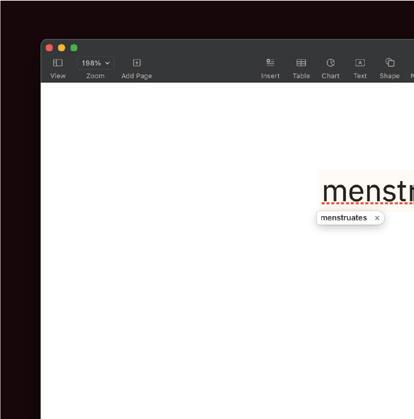

You might notice on the screen behind me is the word ‘menstruators’, it describes everyone who menstruates. This community of over 2 billion people globally, menstruate on any given day, but when I came across this word in my research, I found out that IT DOESN’T EXIST IN THE DICTIONARY. I was baffled to say the least.
Throughout the rest of my presentation, I will be using ‘menstruators’ because “not all people who menstruate are women, and not all women menstruate”.
First of all though, what is a period? When the body menstruates, the uterus discards its monthly buildup of lining. The lining takes the form of menstrual blood and tissue which flows out through the cervix and then vagina.
You might already be thinking “ew, gross” or “why are we talking about this” and that’s okay.
During a conversational workshop with menstruators in my community, we started to break down unconscious words we had learned about periods. Words like “dirty” “embarrassing” and “shameful” came up as we were sharing personal stories and playing Pad Bingo.
One participant said, “Where I’m from, it’s seen as a time when you’re not supposed to touch certain things, because you’re going to make that thing impure. It’s also what people preach and it just
keeps going from there.”
She brought up the elephant in the room—menstrual stigma. Both the language and the communities using it create a culture, an unfortunately stigmatized one.
My participants also mapped their menstrual confidants. We discussed the qualities that make these people their trustworthy listeners and how these conversations made them feel.
It became clear that the more conversations they had, the more confident they felt.
So I wondered, where do we need more menstrual confidence?
As I talked to experts in the field, I learned about an uncountable amount of unique challenges, needs, and experiences menstruators face.
One of the experts, Anmol Sharma, a Master’s graduate in Global Public Health, said something that solidified my argument that practicing menstrual confidence is something profoundly necessary:
“Everyone deserves to have a dignified menstrual experience. Do they feel confident that their environment promotes one? We might think this problem only exists in historically marginalized countries, but no. It exists here too.”
From pre-menses through to post-menopause, a menstruator faces a variety of new experiences that they should be able to confidently navigate. Unfortunately, many of the menstruators I interviewed expressed otherwise.
When recalling the first few months of her period, this 44 year old menstruator described them as traumatizing.
“The first few months of my period were traumatizing. My mom never talked to me about it and when I got my period for the first time, I was lost. I even went as far as to hiding it from her and stealing pads from her cabinet because we had never discussed it before.”
— 44 year-old menstruator
Moving along the menstrual lifecycle to young adulthood, a 25 yearold menstruator described a life-changing event:
“I was ignoring my body for months…Turns out, I had a massive tumor on my ovary… I’m of the mind that if you feel like something is off, it’s probably off.”
— Referring to Page X
Even at the end of the menstrual life cycle , a 53 year-old menstruator shared:
“Menopause sucks. Like it really sucks. It came on with a whole other set of health problems and I didn’t understand what was going on with my body.”
It turns out, confidence builders are needed across the menstrual lifecycle as menstruators are constantly facing new challenges. And conversations can become a great deterrent from forming long-lasting negative associations.
So, how do we practice menstrual confidence through conversations?
I propose we can do so through 4 different typologies: literacy, humour, celebration, and love languages.
Let’s start with literacy because literacy is the core of a conversation.
Founder of the evidence-based non-profit Menstrual Matters, Dr. Sally King, describes her theory of change:
“Once we have education, then maybe we can have conversations about healthy menstrual physiology…This shouldn’t be a political issue, it’s normal.”
As the lack of standardized education about menstruation continues, discussions on periods can reproduce old myths and lead menstruators down a confusing path of trying to navigate social media advice and other medical advice.
How might we motivate menstruators to navigate their experience with a variety of second opinions to confidently take action?
This question led me to design: CLOT, your best A.I. menstrual buddy :)
Clot is a chatbot that allows menstruators of all ages to ask burning questions, receive answers in the voice of their chosen conversation partner, and share their learnings to get human second opinions!
In this scenario, Isa is a 14 year old girl who is curious about tampons. She wants to chat with an 18 year-old menstruator, because her friends say that older sisters are super helpful when it comes to
this kind of stuff. Because she doesn’t have one, CLOT is her next best option to ask about tampons, especially if she can go swimming. After she’s asked all her questions, CLOT nudges her to share this conversation with a friend, to ask them what they think. The more inputs, the better.
For menstruators located in areas where reproductive information is sensitive, these chats can be made anonymously and subsequently deleted.
The goal is for all menstruators to have a quick answer to “I don’t know? Who do I ask?” Clot is just the first answer along that journey.
After chatting to Clot, menstruators are encouraged to chat with other humans.
Imagine talking about periods with your family and friends, the potentially awkward pauses, the confused looks, uncomfortable silences.
What if we could use humor as a tool to confidently approach period talks with family and friends?
Maybe Menstrual Mayhem can give you a little bit of help.
— Referring to Page X
Menstrual Mayhem is an interactive party game with hilarious period-themed charades prompts to play with family and friends!
Each card deck contains different categories like: General Symptoms, First Period, Menopause, and Period Products.
The game is played by splitting into teams while each team plays simultaneous rounds of charades trying to gather the most correct answers for points. After each round, the funniest enactments are shown to the group!
The goal is to Act. Laugh. And let the Chaos Ensue!
But, wouldn’t it be a shame to have a party game and no party?
Have you ever heard of a period party? Historically, this is a celebration held to honor the rite of passage and a first period. But in this
— Referring to Page X
context, it’s a moment of care, celebrating a menstruator’s unique trials and tribulations, no matter where they are in the menstrual lifecycle.
One of my interviewees mentioned that the ritual already existed in her daughter’s friend group.
“My daughter is the last of her friends at school to get her period… All her friends have had period parties, and she’s wondering when she’ll be able to have hers.”
As menstruators have conversations with people in their broader community, can we adopt a new menstrual ritual: period parties to make those conversations more accessible? I, for one, want to go back in time and throw myself a period party for surviving a 2 month period!
With period parties in mind, I founded Blood Sugar ~ For any time of the month :)
Blood Sugar is a cake & bake shop all about baking menstrual confidence into every cake for the period party of your dreams.
Why a celebration? Celebrations are ritualistic and historically represent moments of care within a community. Think birthday parties, coming-of-age celebrations, and more. They also allow for new kinds of celebrations to be easily accepted or adopted in communities of any age or experience .
Blood Sugar held its inaugural Launch Party, in an effort to create and disseminate a period party recipe that partygoers and viewers alike can steal, adjust, and tailor to their taste!
The party’s agenda included three cake tastings. The Seed: Reflecting on Early Menstrual Experiences, The Flower: Reflecting on Menstruation as an Adult, and The Fruit: Reflecting on Menopause & Relationships with Elder Menstruators. The physical design transformed the idea of traditional menstrual-related aesthetics. Using cake-stained bed sheets, clotty-looking jam, and cut fruits and melted red candles to remind of the physical experience of menstruation.
Creating richer and more nuanced documentation of menstrual experiences can help shift the mental models and words we associate
with menstruation on a regular basis. And in turn, incorporate a new ritual into our everyday lives.
Speaking of rituals, when was the last time you sat with a partner or family member and checked on their menstrual experience?
After speaking with many non-menstruators in my community, one said something that hadn’t clicked before:
“There needs to be an easier, more straightforward way to support the menstruators in my life.”
The role of allies can be essential to one’s menstrual experience. Maybe some of you in the audience are curious about how you can tangibly support the menstruators in your lives.
What if we reframe an ally and a menstruator to a ‘Sidekick’ and a ‘Hero’. Does that make you excited?
CODE!RED ~ We’ve cracked the code, so you don’t have to!
CODE!RED is a paired digital experience designed for a menstruator’s community members or sidekicks to support them by completing actionable, tailored, tangible quests.
— Referring to Page X
CODE!RED brings heroes and sidekicks together to complete missions of menstrual care and confidence, tailored using our very own menstrual love language quiz.
By aligning love languages and piggybacking off of a Hero’s health tracking apps, CODE!RED will send Sidekicks’ missions based on their Hero’s needs, preferences, mood!
To show you how the paired experience works, let’s say we have a pair of long-distance romantic partners: Marlo (Sidekick) & Nima (Hero)
Marlo comes across the CODE!RED website and creates his Hero Portal. He invites Nima to match with him, and adds their type of relationship and their distance. These two factors will help CODE!RED send tailored and achievable quests to Marlo!
Once Nima accepts the invite, she will give CODE!RED permission to
track her apple watch inputs.
To finish the pairing, both parties will take their love language quiz and download the CODE!RED app.
Marlo will receive quests by notification. Once in the app, his dashboard will show previous and current quests, including his newest one. He will chat with CODE!RED to choose his quest, give feedback, and log his progress along the way.
Post-Quest, both Marlo & Nima can log feedback so CODE!RED can recommend better quests next time, and aggregate a more comprehensive FAQ on each love language type.
Each menstrual experience is unique, so it can be difficult for a sidekick to find a way to care for the various heroes in their lives: a partner, a sister, a mother, etc. CODE!RED takes out the guesswork for the sidekick. Using a gamified digital experience allows for both heroes and sidekicks to have fun with practicing their menstrual confidence as a team!
I leave these proposals with you and ask you to HAVE THE CONVERSATIONS and ASK THE QUESTIONS you haven’t before. There are people out there in our cities, in our world that will benefit from your curiosity, bringing us one step closer to an inclusively designed society.
I hope this presentation provided you with a little more vocabulary than what you came here with, as through doing this work, finding the words helped me process my own menstrual journey, and I wish the same for all the heroes in the audience as well.
Thank you to my family, cohort, my big sis, faculty and everyone else who stopped to have a conversation with me along the way. Let’s continue to talk periods!>
[End of Transcript from Sama Srinivas’ Thesis Presentation held at the SVA Theatre on May 7th, 2024. Video recording can be found at https://productsofdesign.sva.edu/projects]


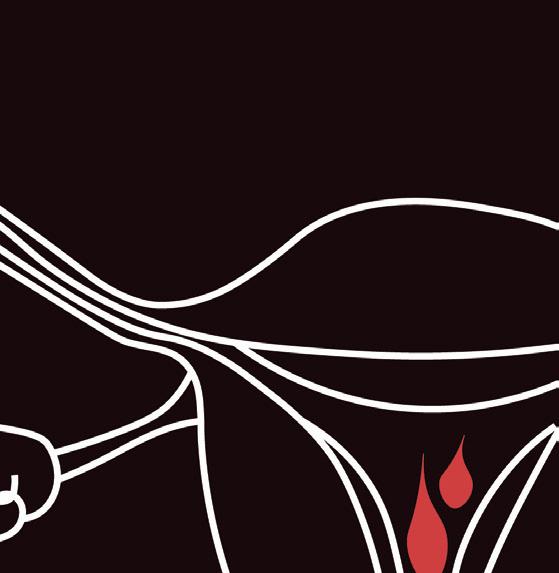






When I began to explore menstrual experiences, firstly my own and subsequently others, it became apparent that there were stages or milestones across the lifespan of a person who menstruates. I had no idea the term ‘menstruator’ existed. I just assumed women would be the audience of this project. And technically, the term ‘menstruator’ doesn’t exist, it’s not even in the dictionary. This strikes me as odd and a testament to the concealment or lack of acknowledgement surrounding menstruation as an experience. Even as I am typing this manuscript, the dotted red underline indicating a word not found in the dictionary lights up all over my document. To be honest, the fact that 25% of the population who experience menstruation don’t yet have the word that describes the community established in the dictionary was baffling to me. Menstrual scientists, researchers, and writers use this word, but it isn’t colloquially known or used in menstrual education or conversations. I, myself, didn’t know the word before I began researching this topic. The reason this word is important is twofold. First, not all women menstruate and not all menstruators are women. It is crucial to include all people regardless of sex to create an accurate picture of this experience. Second, throughout history, language at its core is a tool used to express our understanding of the world.
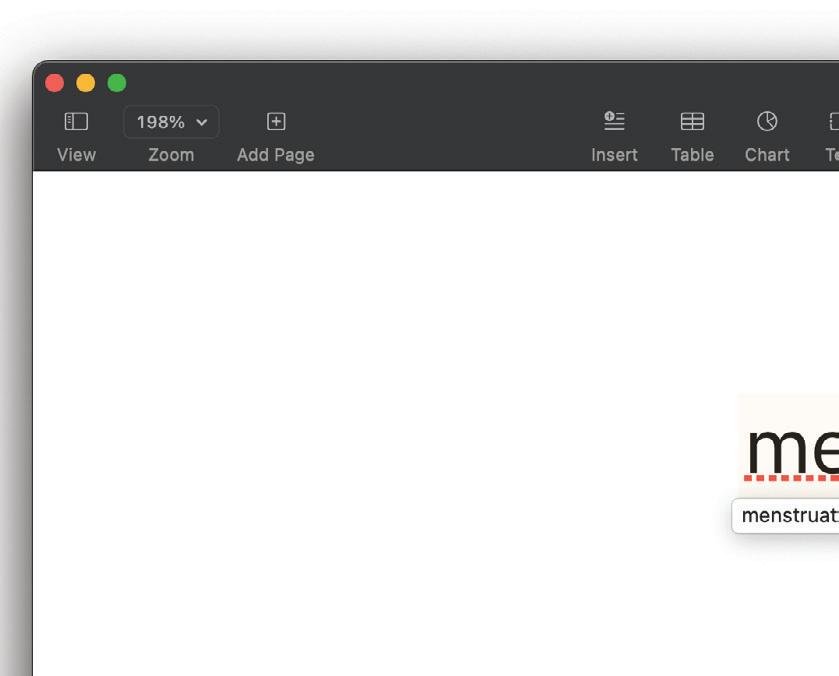
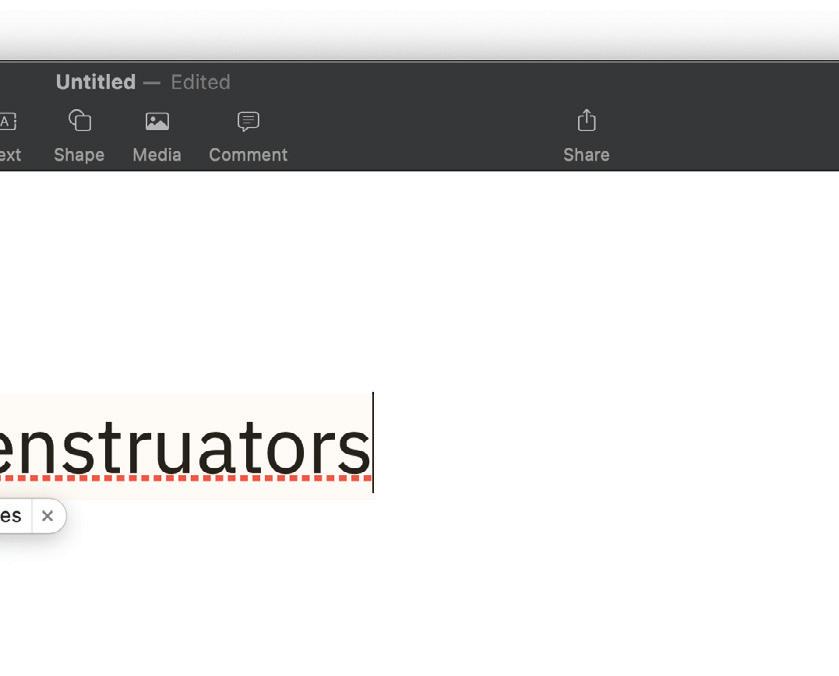

It shapes that understanding and it’s usage is passed down generations. Throughout my research, both primary and secondary, it has become apparent that language and the cultural forces that support that language shape our understanding of the world and subsequently our bodies. Thus conversations and words on menstruation hold the power to liberate a menstruation’s confidence and agency.
I’ve been using a couple different frameworks to break down my audience. The first is the menstrual lifecycle. This lifecycle includes people in all stages including: pre-menses, merache (first period), young menstruator, adult menstruator pre-childbirth, adult menstruator post-childbirth, perimenopausal, and menopausal. Each stage in this lifecycle has great breadth and also a variety of unique challenges, considerations, and experiences. Out of all of these, I have talked to a variety of menstruators in interviews and some glaring challenges came up. First in the young menstruator population: these are crucial years to learn and understand the baseline menstrual experience as well as experiment to find products, tools, rituals that best work for the body. The second is adult menstruators pre-childbirth. This group of people are confused, plenty have tried birth control and had negative consequences, others are discovering chronic menstrual diagnoses like endometriosis and PCOS. There are many new physical challenges that are causing emotional challenges. But particularly in this age group, there seems a need to unlearn “menstrual concealment”: the self-censorship hat has been taught to us by the surrounding cultural forces which is shown by research to have profound impact on a menstruator’s psychological, physical, and social states. Stigma is the big word that menstruators encounter in many micro situations growing into adulthood. Menstrual stigma
“Not all women menstruate and not all menstruators are women.”
—Bobel 2023
harms are real, and they need to be prevented. The third group are those within the perimenopause or menopausal stages. This menstrual experience seems to be shrouded in more mystery than menstruation in general and menstruators are lost on how to navigate these new neurological symptoms, with seemingly no support from the medical community. After speaking with menstruators across the lifecycle, narrowing down to one part or age group seemed to exclude people in need of representation and care.



Menstrual stigma is rooted in social forces like misogyny, colonialism, and capitalism and causes menstruators harm physically, emotionally, psychologically, and socially. Language, discourse, and these forces shape our understanding of the body, thus conversations on menstruation hold the power to liberate menstruators’ agency and bodily autonomy.
Literacy is a must for “when we lack knowledge, we cannot effectively act to effect change” (Bobel 2020).
Research has shown that on a physical and mental level, “secrecy of menstruation, experience of body shame and pain during menstruation predicted worse mental HRQOL. To believe in the proscriptive role and the unpleasantness of menstruation, experience of body shame, medication for menstrual pain and not holding a university education predicted worse physical HRQOL’ (Sveinsdóttir 2018). Stigma hurts and it’s silent in its attack, embedded in our mental models before we get a chance to unlearn it. When it does seep in, and it will, menstruators internalize the stigma-fed discourse and “they become disembodied, self-objectify and willingly engage in their own self-surveillance and self-discipline” (Wood 2020). The psychological effects can lead to diagnostic delays, disease illiteracy, and other harms. Socially, conversations around menstruation have become more frequent, discussing period products and negative symptoms, but there is a lack of celebrations, of wins. To celebrate one’s menstrual experience, a menstruator still needs to know what is celebratory and what is cause for concern. While conducting user interviews and my co-creation workshop, there were a few similar gaps of knowledge for many of the participants. Many feared TSS, or toxic shock syndrome, yet did not know more than a tampon causes the infection. When we dug deeper into the issue, we learned TSS is caused not only, in very rare cas-
es, by a longer-than-reccomended wear of a tampon, but also open wounds and surgeries. So where did this collective fear come from? Fear-mongering from teen magazine and potentially social media. The discourse hasn’t changed to my knowledge, my high school health class brushed over it in a slightly worrying fashion. Even I, now equipped with this knowledge, still have an aversion to tampons. This brings up now, the importance of menstrual education, at school and at home especially. Menstrual education at home includes a pivotal set of conversations needed to set a menstruator up for success for the rest of their journey. From my users and co-creation participants, almost all had a distinct memory of their menarche, their first period. Some shared “embarrassing” stories, others shared “traumatizing” ones. But collectively, everyone had a bit of confusion when their first period came, and especially afterwards if they were experiencing irregular symptoms. According to them, they had little to no knowledge of chronic menstrual conditions like PCOS, PCOD, PMDD, and Endometriosis, all of which have a variety of symptoms. Endometriosis affects “10% of menstruators, but still has a 9-10 year diagnosis delay in the US”. The knowledge gap is one reason for this, as is the lack of medical research going into women’s and menstrual health conditions. Stigma is at it again.
Study after study have found that due to lack of conversations about menstruation, negative emotions like shame, fear, and embarrassment are the paramount associations for menstruators and their initial menstrual experience. After talking to many menstruators throughout my research, this unfortunately rings very true for a lot of them. After speaking more deeply about those feelings and experiences, it became clear that these associations profoundly impacted their confidence and understanding of their bodies as menstruators. A lot of the times this impact stayed with them well into adulthood, for some even into menopause.
A study “commissioned by period education campaign Betty for Schools... found women and girls continue to suffer from a lack of menstruation awareness…A majority of women felt scared (60 percent) or embarrassed (58 percent), and half did not feel confident enough to tell anyone else they had started their period.”
Another study “conducted by OnePoll in conjunction with Diva International Inc., makers of the DivaCup, examined the first-time menstrual experiences of 2,000 women and examined the generational differences in how those first times play out… 30 percent claim they were left feeling utterly confused when their period first arrived. Another 43 percent say that they were scared by the experience, while the majority – 52 percent – felt sheer embarrassment.”
Because this experience is fairly common, my next inquiry is why? The reason was glaring. Menstrual stigma is a cloudy sky that covers a mentruator’s knowledge, agency, and communication about their bodies. It shrouds menstruation in silence, shame, and uncleanliness. Through my research, I have found three kinds of impact of menstrual stigma: psychological, physical, and social.
Stigma hurts and it’s silent in its attack, embedded in our mental
models before we get a chance to unlearn it. When it does seep in, and it will, menstruators internalize the stigma-fed discourse and “they become disembodied, self-objectify and willingly engage in their own self-surveillance and self-discipline” (Wood 2020). The psychological effects can lead to diagnostic delays, disease illiteracy, and other harms. “Wood suggests that women’s vigilance about menstrual concealment is not freely chosen, but a required self-disciplinary practice rooted in menstrual discourse that characterizes menstruation as stigmatized, taboo, and therefore shrouded in secrecy. The concealment imperative is a form of social control and a body project that keeps women disembodied and objectified.” This taboo was frequently described in my conversations with menstruators especially with those who come from cultural backgrounds where historically periods are viewed as dirty, something to be kept secret especially from male family members and outsiders, even as far as temples not allowing entry if one is on their period. This led me deeper into the role of culture and how that manifests itself in rituals. A ritual is anything from when one takes a shower, to a holiday party. Menstrual rituals exist as well, and for many when the onset of menstruation begins the ritual that is learned, is one of self-censorship driven by forces like misogyny, colonialism, and capitalism.
“The first few months of my period were traumatizing. My mom never talked to me about it and when I got my period for the first time, I was lost. I even went as far as to hiding it from her and stealing pads from her cabinet because we had never discussed it before.”
–44 year-old menstruator
This menstruator still was not comfortable sharing her menstrual experiences with others even though raising a daughter was an opportunity for her to change the generational trend of menstrual shame.
Research has shown that on a physical and mental level, “secrecy of menstruation, experience of body shame and pain during menstruation predicted worse mental HRQOL. To believe in the proscriptive role and the unpleasantness of menstruation, experience of body shame, medication for menstrual pain and not holding a university education predicted worse physical HRQOL’ (Sveinsdóttir 2018).
“I had an ectopic pregnancy and the amount of pain I was in was astronomical. I almost died because I gaslighted myself into believing my pain was normal.” – 48 year-old menstruator with Endometriosis
While talking to subject matter expert Dr. Elizabeth Kissling, we discussed further how conversations around menstruation have changed socially from being not discussed at all to only discussing the negative parts of menstruation.
“…there are extreme consequences to stigma. The culture has changed a little. It’s okay to talk about menstruation in some circles but only when it’s problematic. Less often is it about healthy menstruation.”
One menstruator reflected this when reflecting on the community she grew up in, “Where I’m from, it’s seen as a time when you’re not supposed to touch certain things, because you’re going to make that thing impure. It’s also what people preach and it just keeps going from there.” She brought up the elephant in the room—menstrual stigma. Both the language and the communities using it create a culture, an unfortunately stigmatized one.
Period Party: Trust & Listening Chapter 3.1
After deciding on menstruation as a research endeavor, I began to look at menstruation in different contexts: Conditions of the Body, Conditions of Menstruation, and Conditions of the World. Where do these conditions, or more often, limitations surrounds and engage with a menstruator? One glaring thread that I found and followed was the lack of conversation surrounding menstruation and related experiences. The silence was oppressive. And within this silence I found one question that I could not escape from: Where are menstruators talking and who are they talking with?
During a conversational workshop with menstruators in my community, we started to break down unconscious words we had learned about periods. Words like “dirty” “embarrassing” and “shameful” came up as we were sharing personal stories and playing Pad Bingo.
My participants also mapped their menstrual confidants. We discussed the qualities that make these people their trustworthy listeners and how these conversations made them feel.


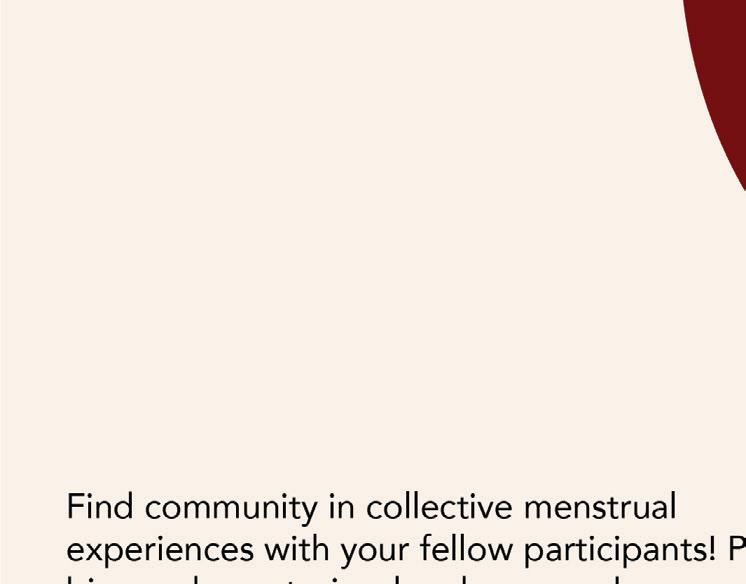
















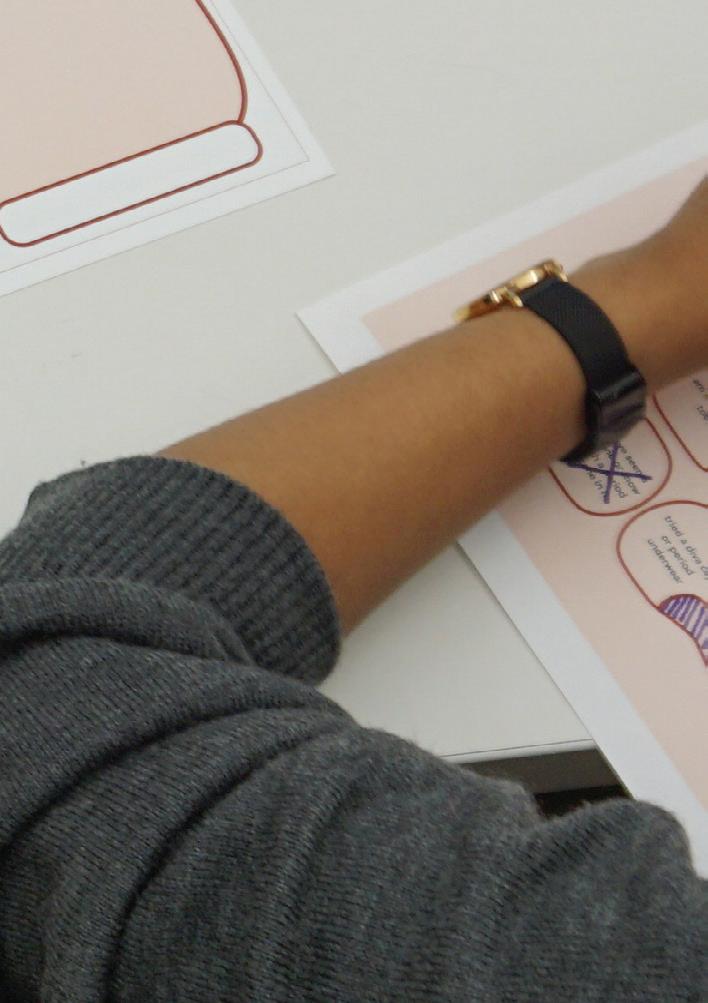


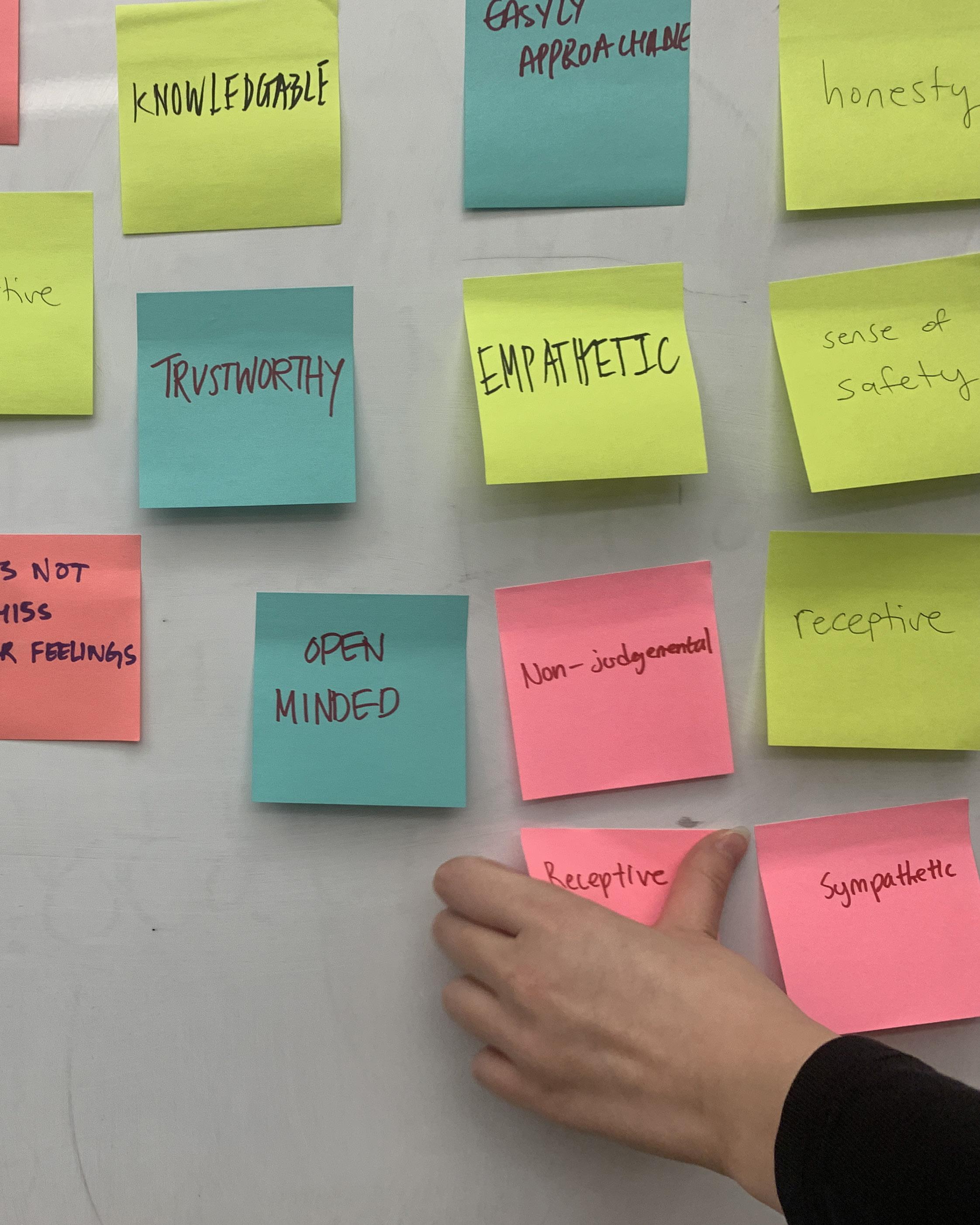


The party agenda included a short intro of my thesis and what this period party will entail, followed by Pad Bingo, Trust & Listening Mapping, and Collective Reflection & Whiteboarding.
The goals of the event included: Learn from my participants: Who do they talk to about menstruation, if any? What kinds of things do they share? What kinds of communities do they find themselves a part of?
Many identified their family & friends as their inner circle. And would report physical symptoms to either their mom or dad (depending on family dynamics). A few participants mentioned that they would talk to a care provider only if symptoms were severe and truly out-of-the-blue/could not be rationalized. (Some believe that if it’s a one or two time occurrence it’s not a big deal?)
A lot of participants didn’t know what toxic shock syndrome was, but they were afraid of it. That aversion made them automatically never try tampons during their whole menstrual lifecycle thus far. It became clear that the more conversations they had, the more confident they felt.
So I wondered, where do we need more menstrual confidence?
Over the course of the year, I had interviewed over 20 menstruators and non-menstruators in an effort to learn the vast challenges, needs, pain points and experiences that they had all faced. For their privacy, I am unable to share photographs from those meetings but here are some process pictures of co-creating, feedback sessions, and whiteboarding with those interviewees.


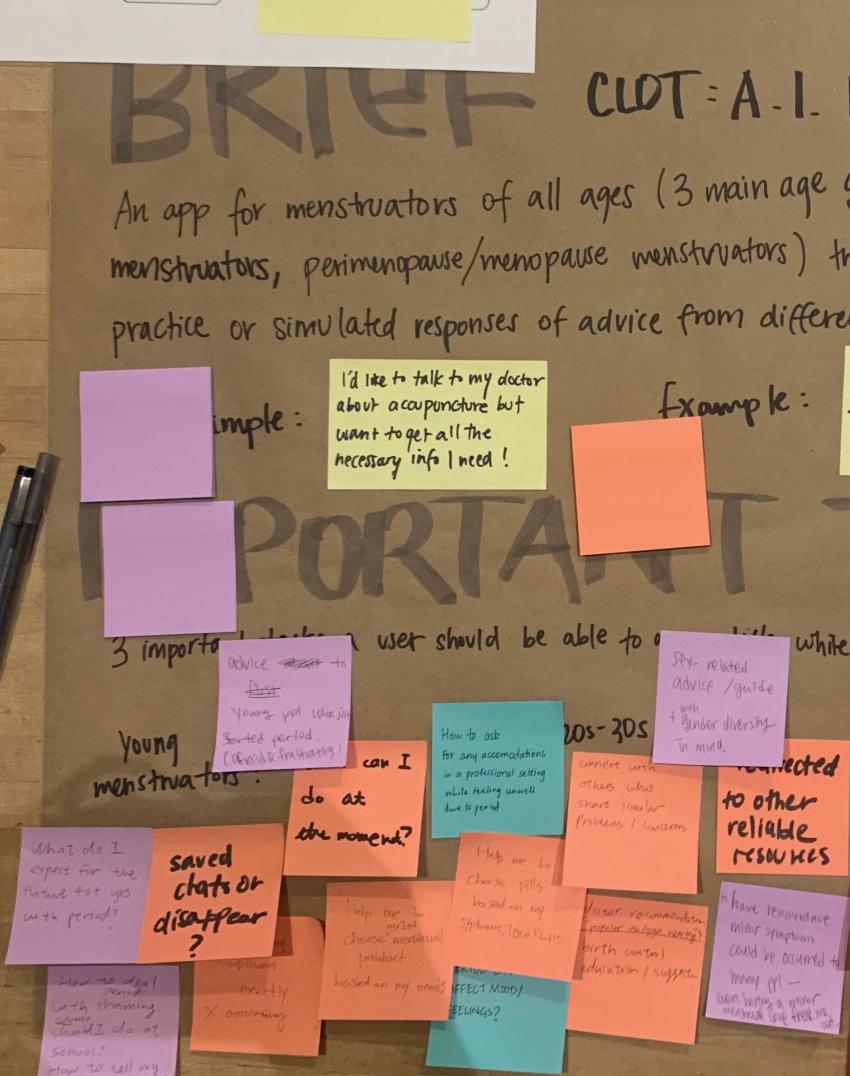
I talked to experts in the field: Professors of Menstrual and Gender studies, Doctors in Reproductive Health and Gender Law, Social Impact and Service Advocates, and the Medical Director of Women’s Health of LA County.
One of the experts, Anmol Sharma, a Master’s graduate in Global Public Health, said something that solidified my argument that practicing menstrual confidence is something profoundly necessary:
“Everyone deserves to have a dignified menstrual experience. Do they feel confident that their environment promotes one? We might think this problem only exists in historically marginalized countries, but no. It exists here too.”
From pre-menses through to post-menopause, a menstruator faces a variety of new experiences that they should be able to confidently navigate. It turns out, confidence builders are needed across the menstrual lifecycle as menstruators are constantly facing new challenges. And conversations can become a great deterrent to forming long-lasting negative associations. How do we practice menstrual confidence through conversations? I began to prototype to explore and validate the plausabiity of this idea.


Blood Sugar 1.0
Chapter 4.1
A provotype is a prototype made to provoke its audience. In my case, this was an ideal first exercise to provoke a conversation around menstruation. Killing the silence was the goal. I began to research how to provoke but not alienate an audience that might perceive menstruation as ‘gross, unhygienic, or taboo’. Stand-up comedy as an art form to make uncomfortable topics more ‘digestible’ was a method I started to appreciate. Humor as a tool to destigmatize and provoke conversation was a goal I wanted to reach. From this line of thinking, Blood Sugar was born.
This was the early first version of Blood Sugar which would be further developed later on in the course of this thesis. At its core, Blood Sugar is a cake shop that sells cakes for period parties. Think of a first period party or a ‘I ended a 2 month long period’ party. At this point, conversation could spark from a good cake and humorous branding. The play on the words is a play, but its not to disguise the importance of the conversation that it evokes, rather a lens to make the uncomfortable comfortable and hopefully soon, normalized.
What if periods were celebrated in our cultures? Why do we need to celebrate menstruation? Blood Sugar led me down the root of exploring menstrual rituals and celebration as a rituals in cultures around the world. What I found is that celebrations in particular have a ritualistic quality that allows for an easier cultural adoption or practice. Celebrations are a social force. Complex social and cultural forces shape a menstruation’s understanding of the body, and thus conversations, like the one someone might have after seeing Blood Sugar’s branding, hold the power to liberate a menstruation’s agency and community.








The Open Door Chapter 4.2
As I was gauging the idea and need of Blood Sugar through various interviews, I had an eye-opening insight emerge: everyone who expressed a negative association to their first period, still struggled with the consequences of those experiences later in life. This brought the focus onto early menstruators in particular, and the idea of ‘The Talk’. This is one of the first conversations a menstruator might have in their menstrual lifecycle, barring early exposure to social media and the internet. But instead of one conversation, what if we had more? What if they continued along the lifecycle? Would this prevent confusion, fear, and other negative associations? So I thought, how might we support parents and their children who menstruate in having open, empowered, and continued conversations about menstruation? I designed The Open Door, a lifetime-member platform, with both online and physical resources, for both parents & guardians and their menstruating children to have continued conversations about menstruation. Let’s collectively agree that a one-and-done “Talk” isn’t setting a young menstruator up for success, especially when menopause is way down the line. The Open Door has a variety of “Talks”, the first marketed towards parents called “The First Talk”. This is to help them learn and teach their young menstruator all they need to know. After menarche, there is a “hand-off”, where parents create a child account to theirs set up with the rest of the “Talks”: “The Self-Talk”, “The Product Talk”, “The Medical Talk”, and “The Partner Talk”. Both parent and child dashboards have talking strategies for when these topics need to be touched. Bringing all of this together, I hypothesize that destigmatizing menstruation is possible through menstrual education, literacy, and conversation. This can positively impact a menstruator’s self-perception, self-advocacy, and medical decision-making.
This is where conversations and confidence building came into contact. The rest is history as they say. (But please continue reading to see my proposed interventions for practicing menstrual confidence through conversations).






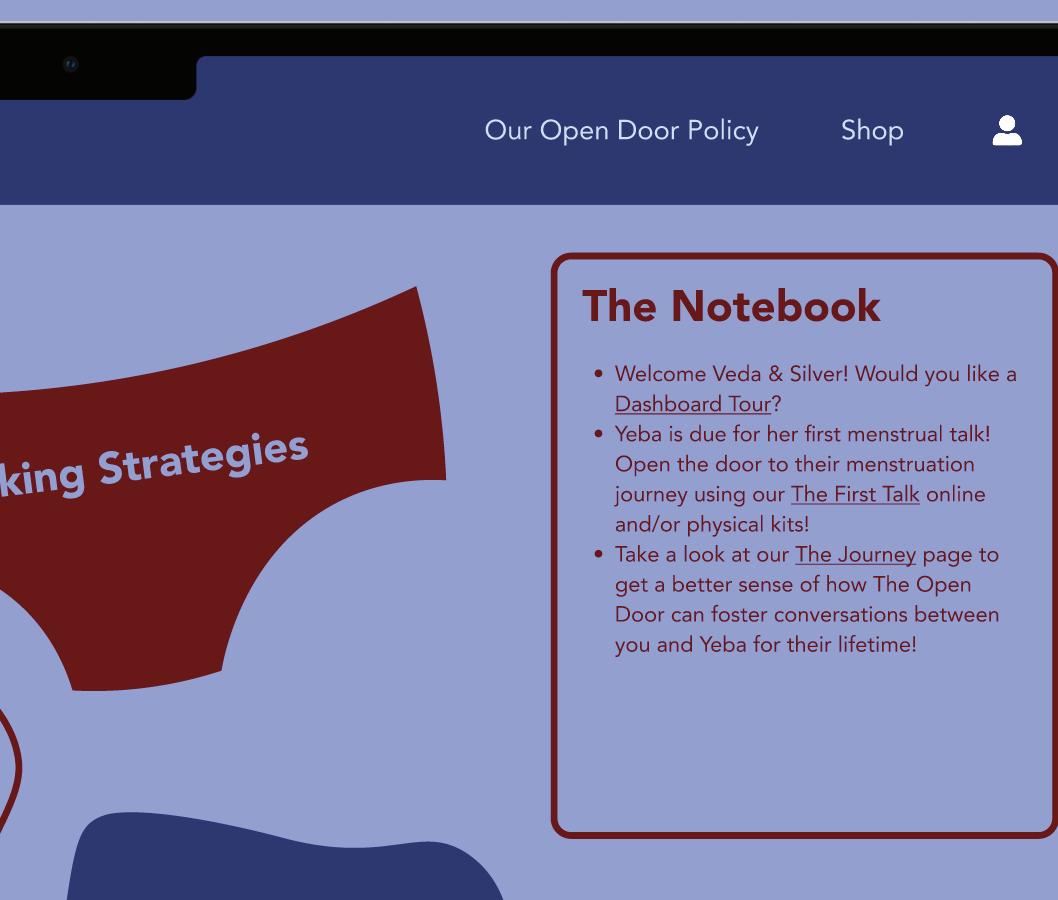



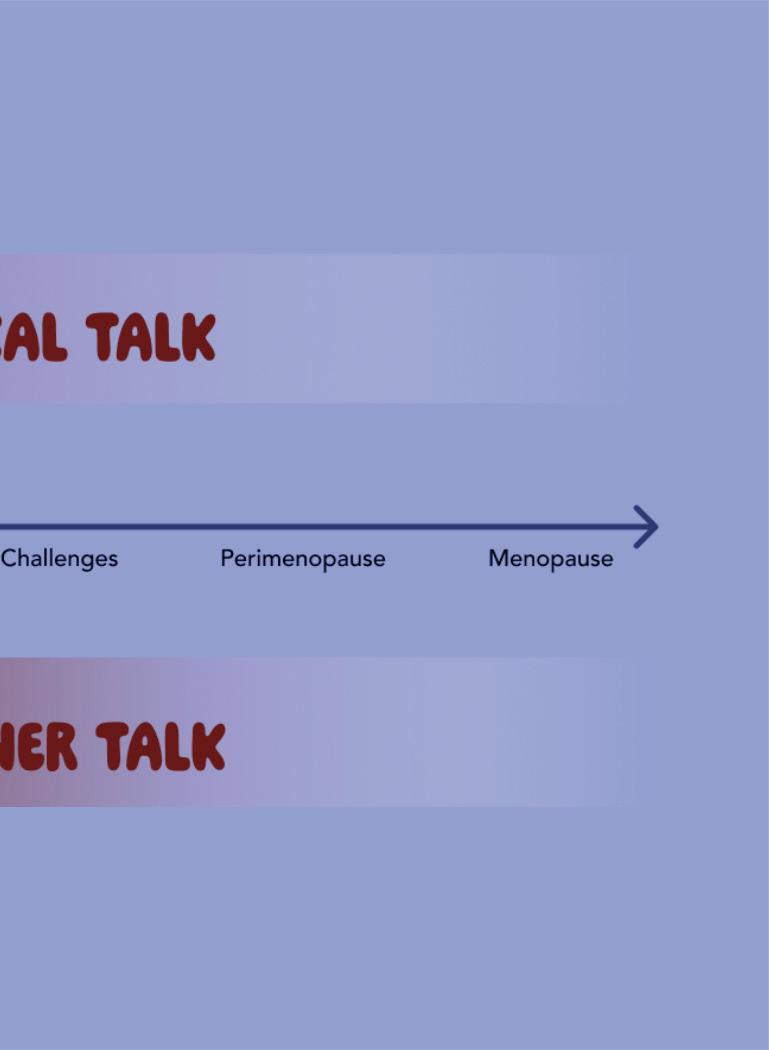



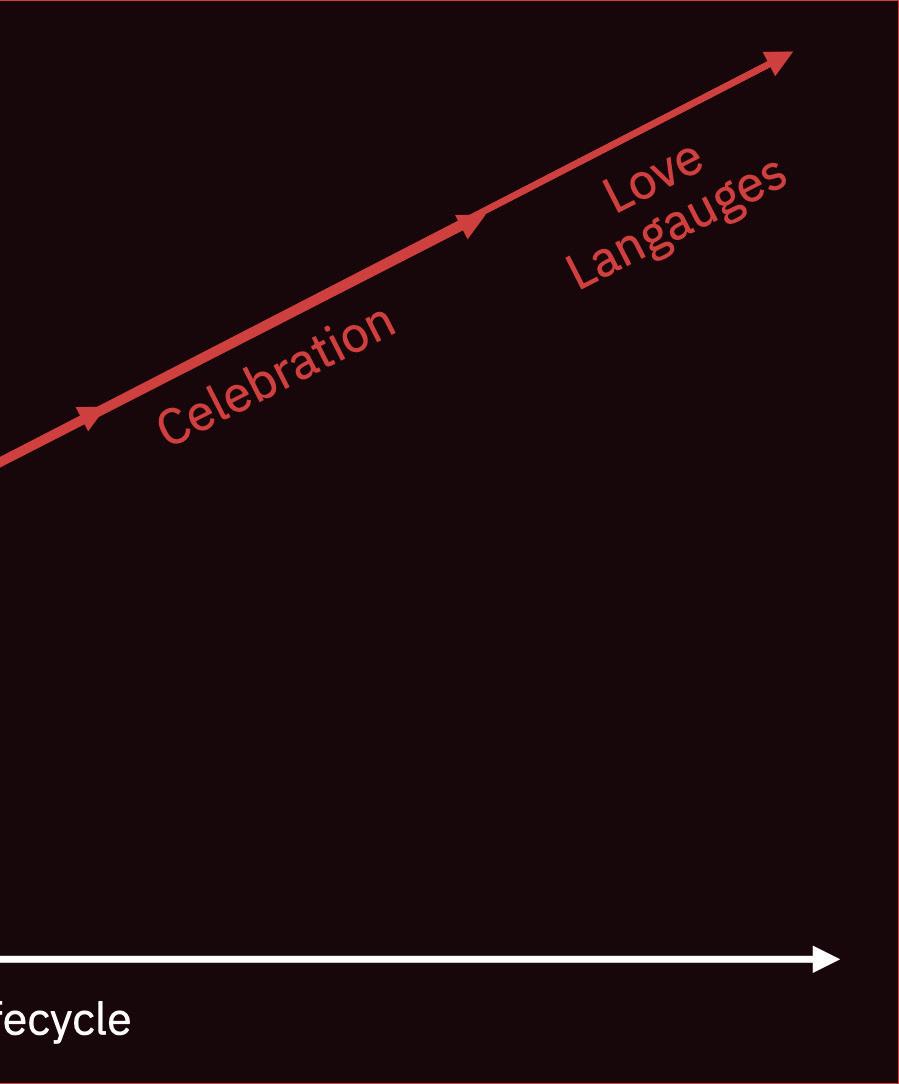
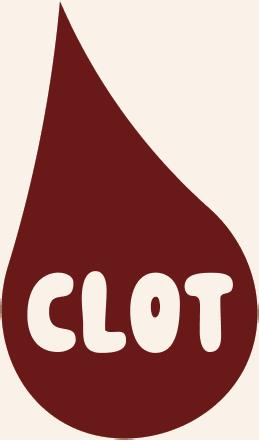
*clots are normal if they are smaller than a grape!
Your best A.I. menstrual buddy :)
Once we have education, then maybe we can have conversations about healthy menstrual physiology…This shouldn’t be a political issue, it’s normal. The lack of research on the few health conditions are reduced to being normalized and dismissed.
– Dr. Sally King, Founder of Menstrual Matters

From the culmination of my user interviews and secondary research, it seemed that there was an opportunity to design for a variety of conversations. One conversation in particular became of interest in my research, “the Talk” that happens between parents/ guardians and pre-menstruation or menstruating children. Through a variety of user interviews, it became apparent that there was an opportunity to reframe the conversation of ‘The Talk’ into an ‘Open Door’. Many menstruators expressed negative associations to their first few periods, and even more impactful was the internalized idea of concealment. The Open Door as a prototype was meant to express the potential of continued conversations on menstrua-
tion between parents and menstruating children (potentially those who are non-menstruators as well). From this early prototype, the idea needed further confrontation of the following assumptions:
The second refinement this product and service needed was a blueprint breakdown. What features would exist and how would they flow? Based on this blueprint, it became apparent that the product was to complex, it needed paring down for the purposes of the curriculum. Another insight was the hidden opportunity of delving into the AI chatbot more deeply. As a thesis about language, the importance of its use and communication, the elephant in the room was AI and its wide spread use in the past months.
To tackle the earlier assumptions, I conducted a series of user interviews and focus groups. I talked to three 50+ perimenopausal or menopausal menstruators, four 40+ post-childbirth menstruators and parents of young menstrutors (or potential young menstruators), and one 17 year old menstruator. What I found is that confusion and literacy gaps exist across the menstrual lifecycle, not just for young menstruators. Also, the internet & communities online are the go-to places for information when the need strikes (across all ages). My insight: This app needs to be accessible across the menstrual lifecycle. I also held a small virtual focus group with 2 non-menstruators in my immediate community. I utilized Miro as a way to collect their thoughts and promote further discussion. My insight: Non-menstruators needs a supportive analogous solution, but this app is not for them. Lastly, I held a co-creation session with a few students from the SVA Interaction Design department.
AI ethics became is a very important and tumultuous point of tension in this project. I began to consider the sensitive data that might be uncovered through conversations with Clot, and started to get stumped by questions like: Would this be a responsible, reliable digital interaction for my users, who are vulnerable? How will this AI be trained responsibly? In the end, I don’t think I have a great answer other than the insight that the AI is not a replacement for a conversation with a person, rather a tool to help them with individual concerns they might not bring to someone else and encourage them to talk to a human. I think this product would play a key role in facilitating bringing a menstrual conversation to someone outside of just self-conversation.
Key Insights
1. This app needs to be accessible across the menstrual lifecycle.
2. Non-menstruators need an analogous supportive solution, but this app is not for them
3. The AI is not a replacement for a conversation with a person
CLOT is an app for menstruators across the lifecycle for to ask menstruation-related questions, practice conversing in a simulated environment, and access a curated resource library with redirection to further resources. The goal is that all menstruators have the answer to the question “I don’t know? Who do I ask?”CLOT is just the first step along that journey.
How might we motivate menstruators to navigate their experience with a variety of second opinions and confidently take action?
CLOT is an A.I. trained chatbot for menstruators of all ages to:
1. Ask period questions
2. Receive answers in the voice of chosen conversation partner
3. Share with other for second opinions
The goal is for all menstruators to have a quick answer to “I don’t know? Who do I ask?” CLOT is just the first answer along that journey.
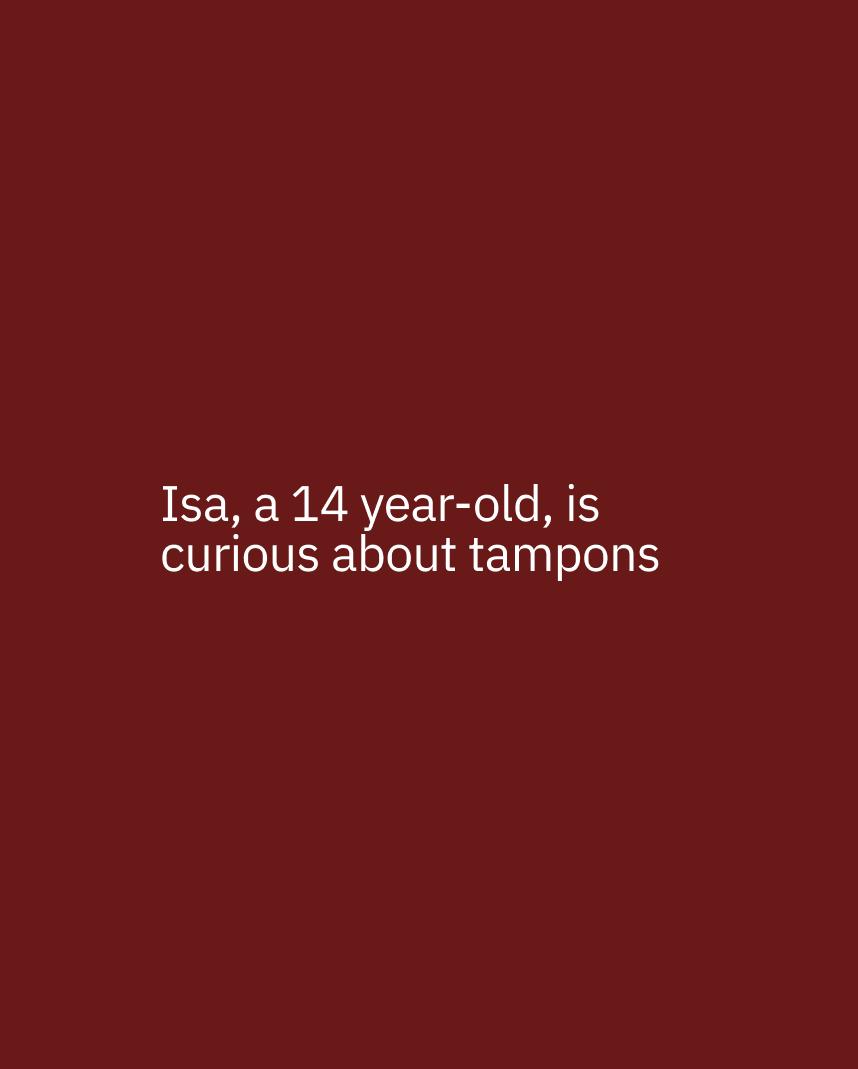
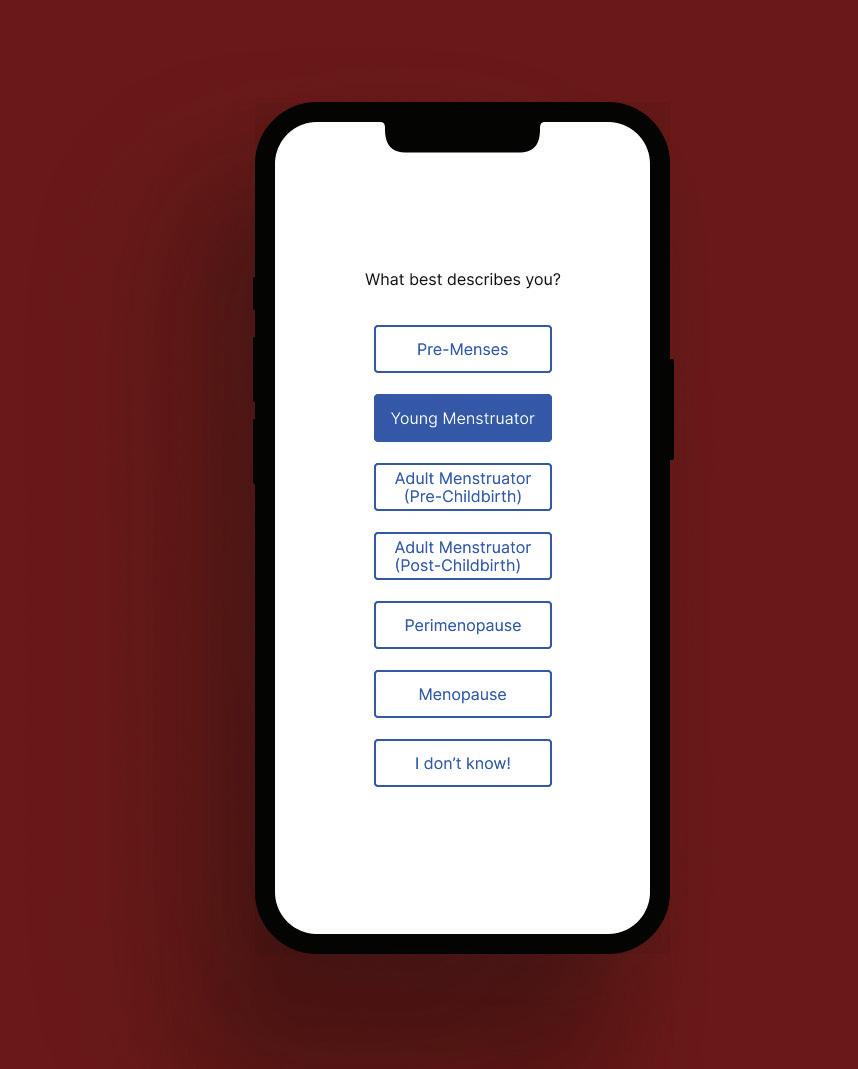


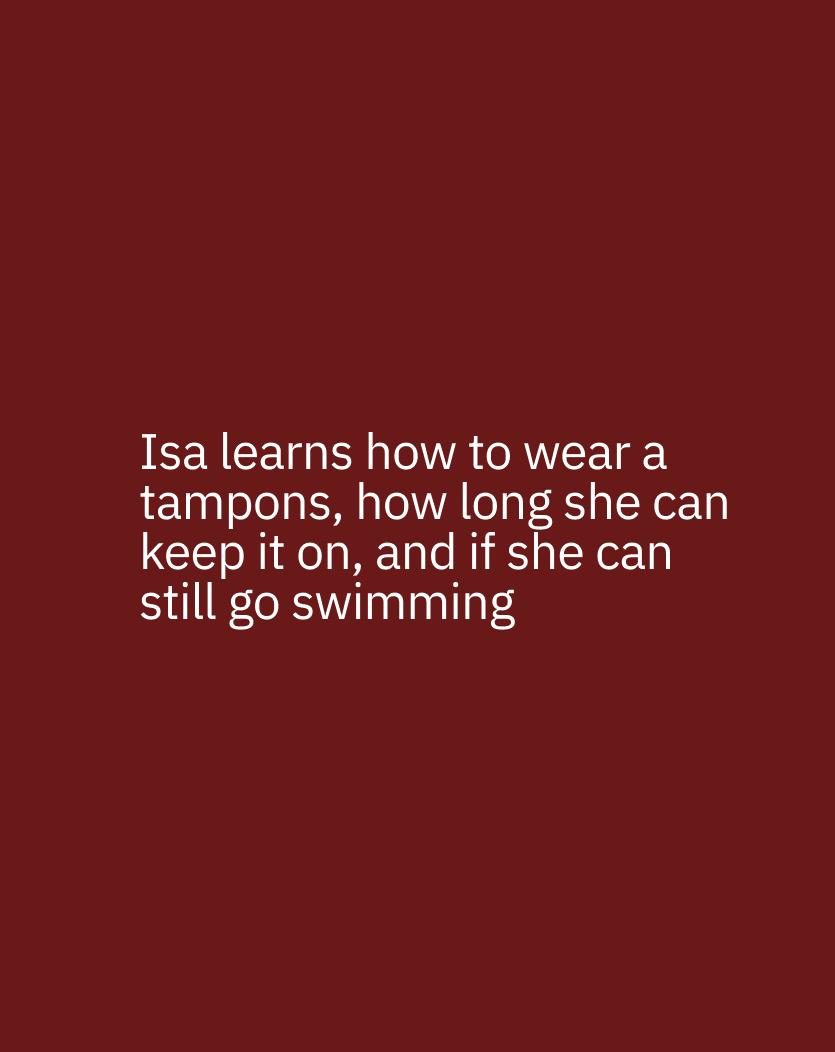

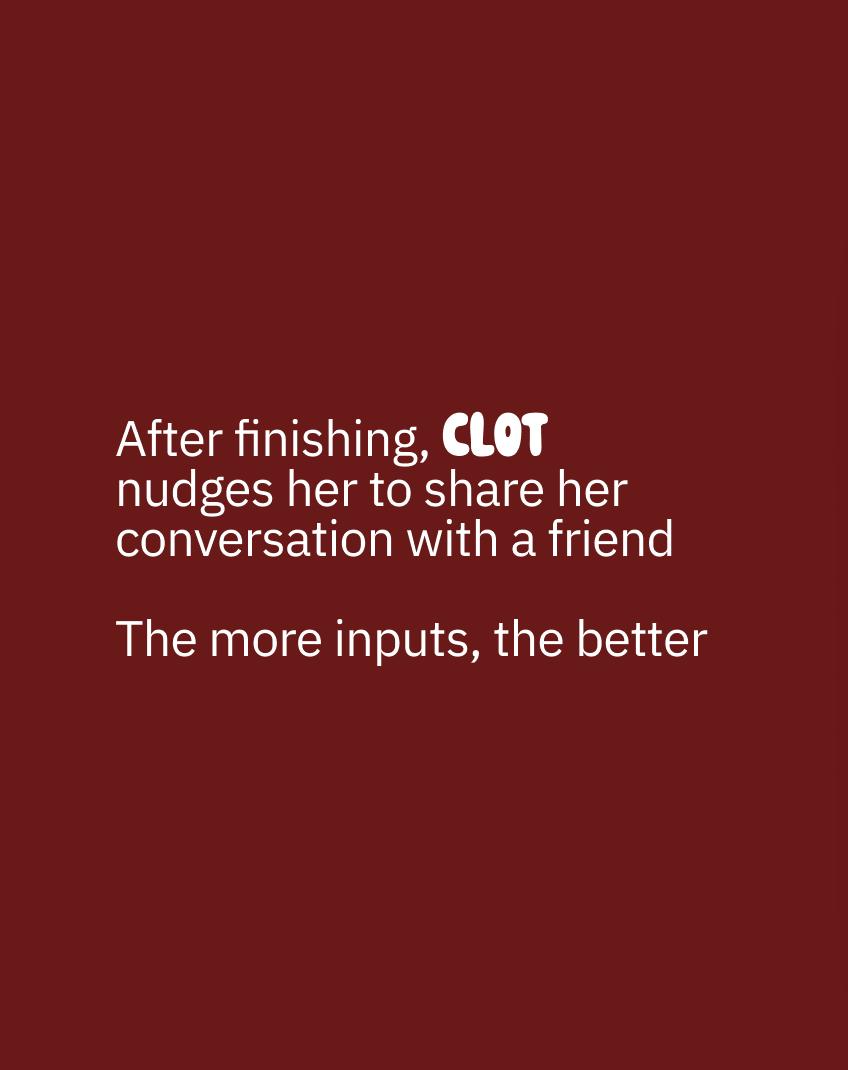
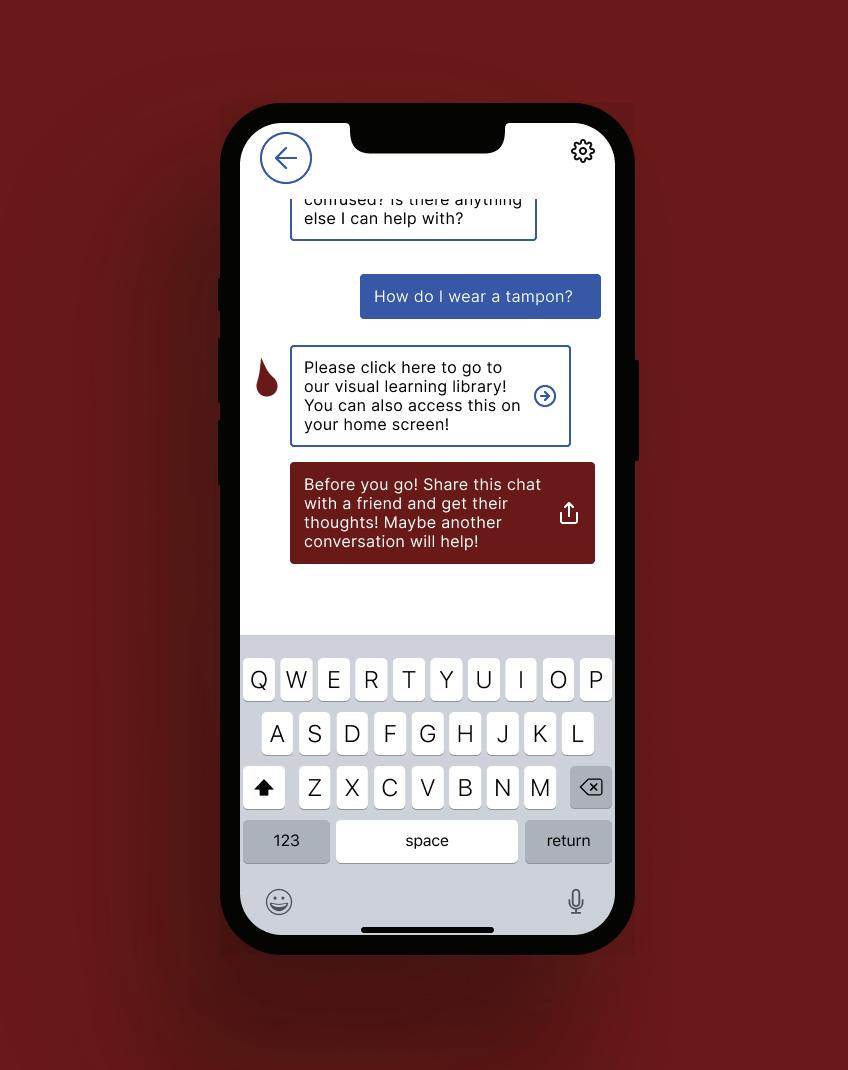


After chatting to Clot, menstruators are encouraged to chat with other humans. Imagine talking about periods with your family and friends, the potentially awkward pauses, the confused looks, uncomfortable silences. What if we could use humor as a tool to confidently approach period talks with family and friends?
Maybe Menstrual Mayhem can give you a little bit of help.
Menstrual Mayhem is an interactive party game with hilarious period-themed charades prompts to play with family and friends. Each card deck contains different categories like: General Symptoms, First Period, Menopause, and Period Products. The game is played by splitting into teams while each team plays simultaneous rounds of charades trying to gather the most correct answers for points. After each round, the funniest enactments are shown to the group!
The goal is to Act. Laugh. And let the Chaos Ensue!
The 30 second Menstrual Mayhem commercial can be found at samasrinivas.com. Please have a watch and a laugh!


What if we could us humor as a tool to approach period conversations with family & friends confidently?


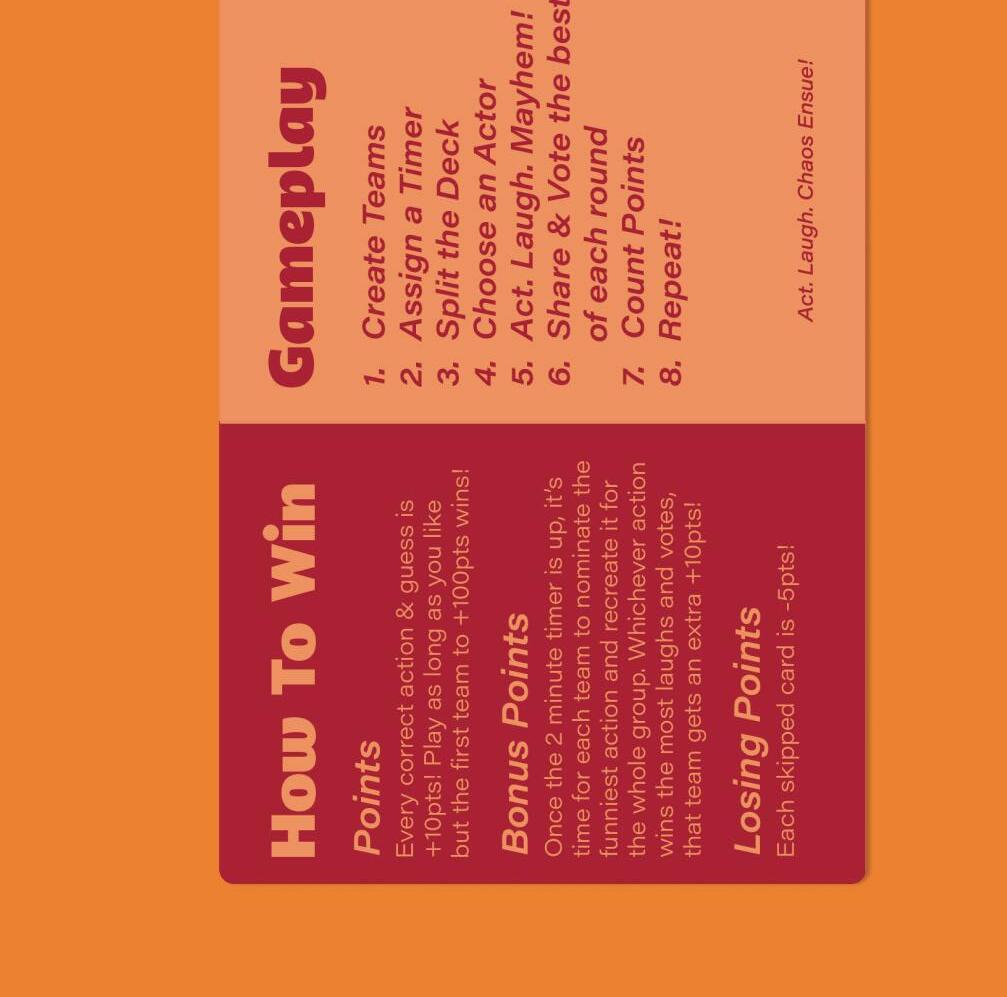


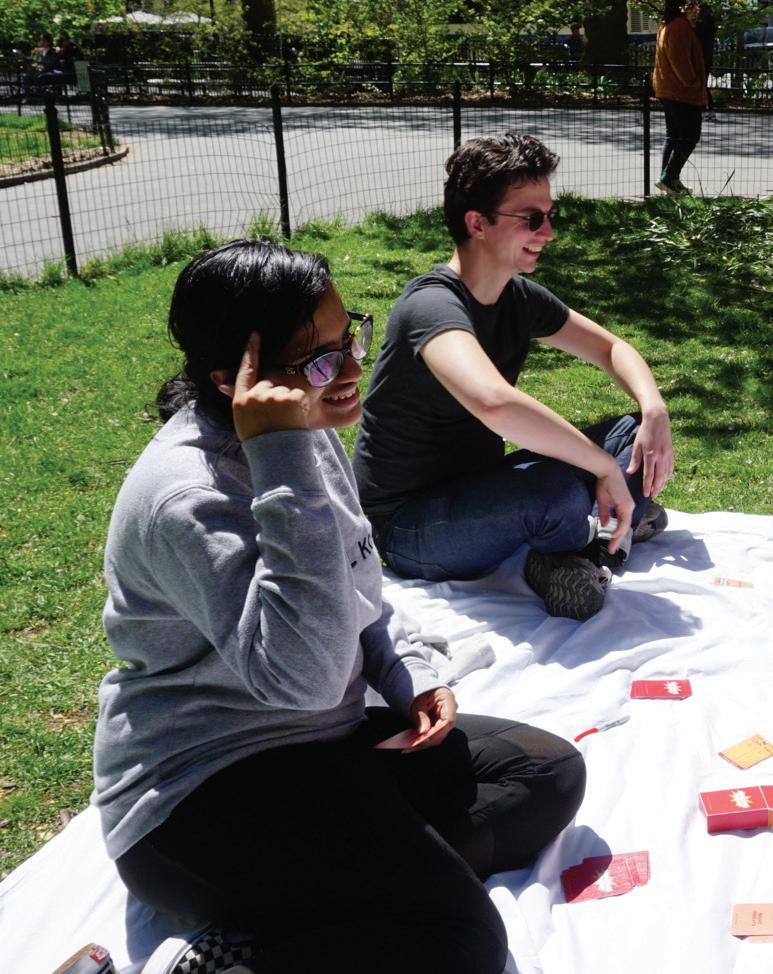
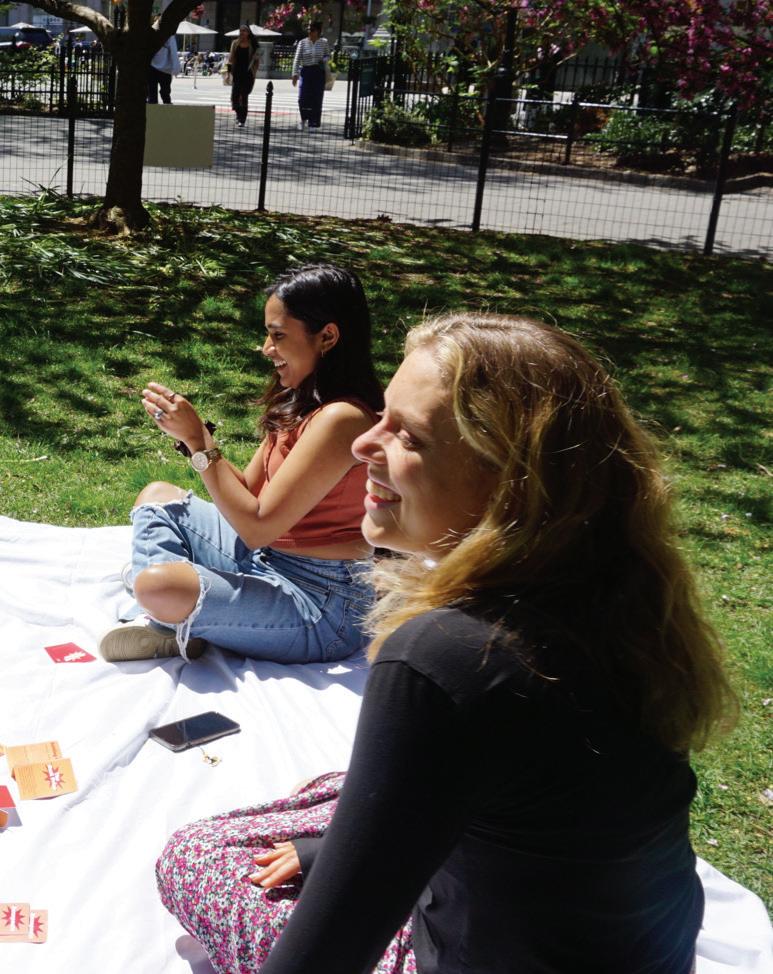

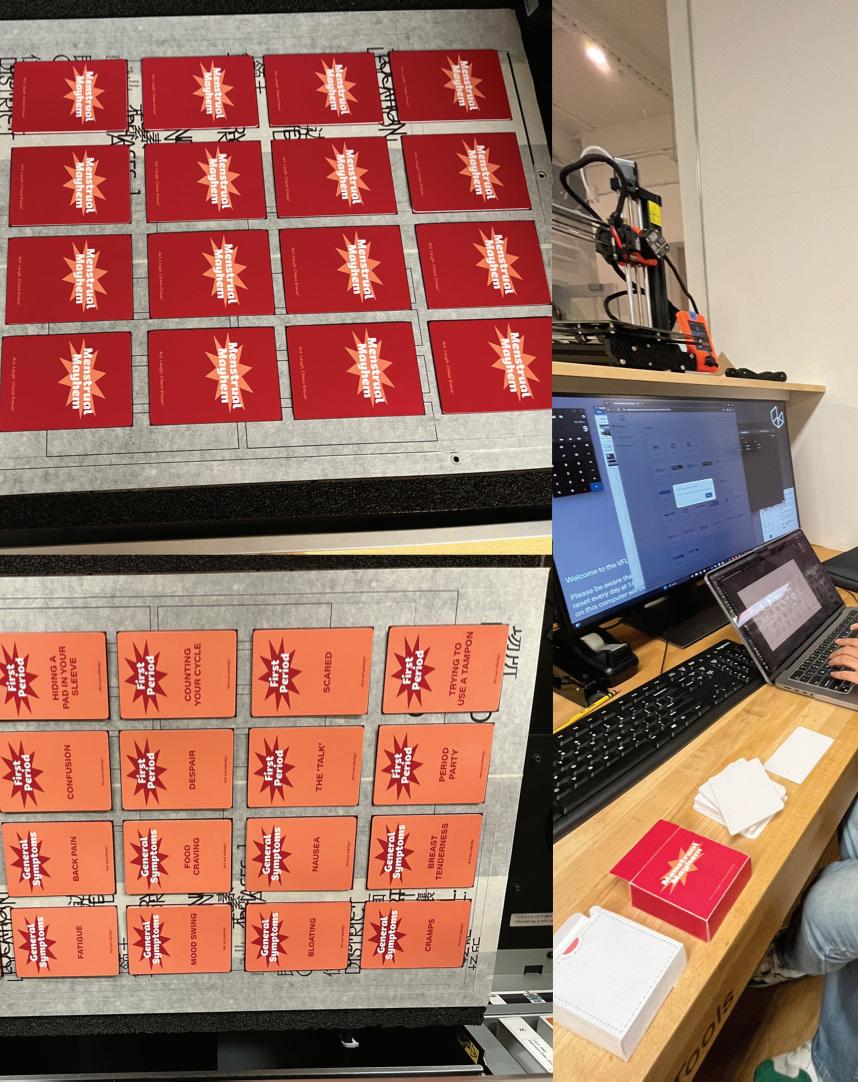
What is a Period Party?
But, wouldn’t it be a shame to have a party game and no party?
Have you ever heard of a period party? Historically, this is a celebration held to honor the rite of passage and a first period. But in this context, it’s a moment of care, celebrating a menstruator’s unique trials and tribulations, no matter where they are in the menstrual lifecycle.
One of my interviewees mentioned that the ritual already existed in her daughter’s friend group.
“My daughter is the last of her friends at school to get her period… All her friends have had period parties, and she’s wondering when she’ll be able to have hers.”
As menstruators have conversations with people in their broader community, can we adopt a new menstrual ritual: period parties to make those conversations more accessible? I, for one, want to go back in time and throw myself a period party for surviving a 2 month period! With period parties in mind, I founded
For any time of the month :)
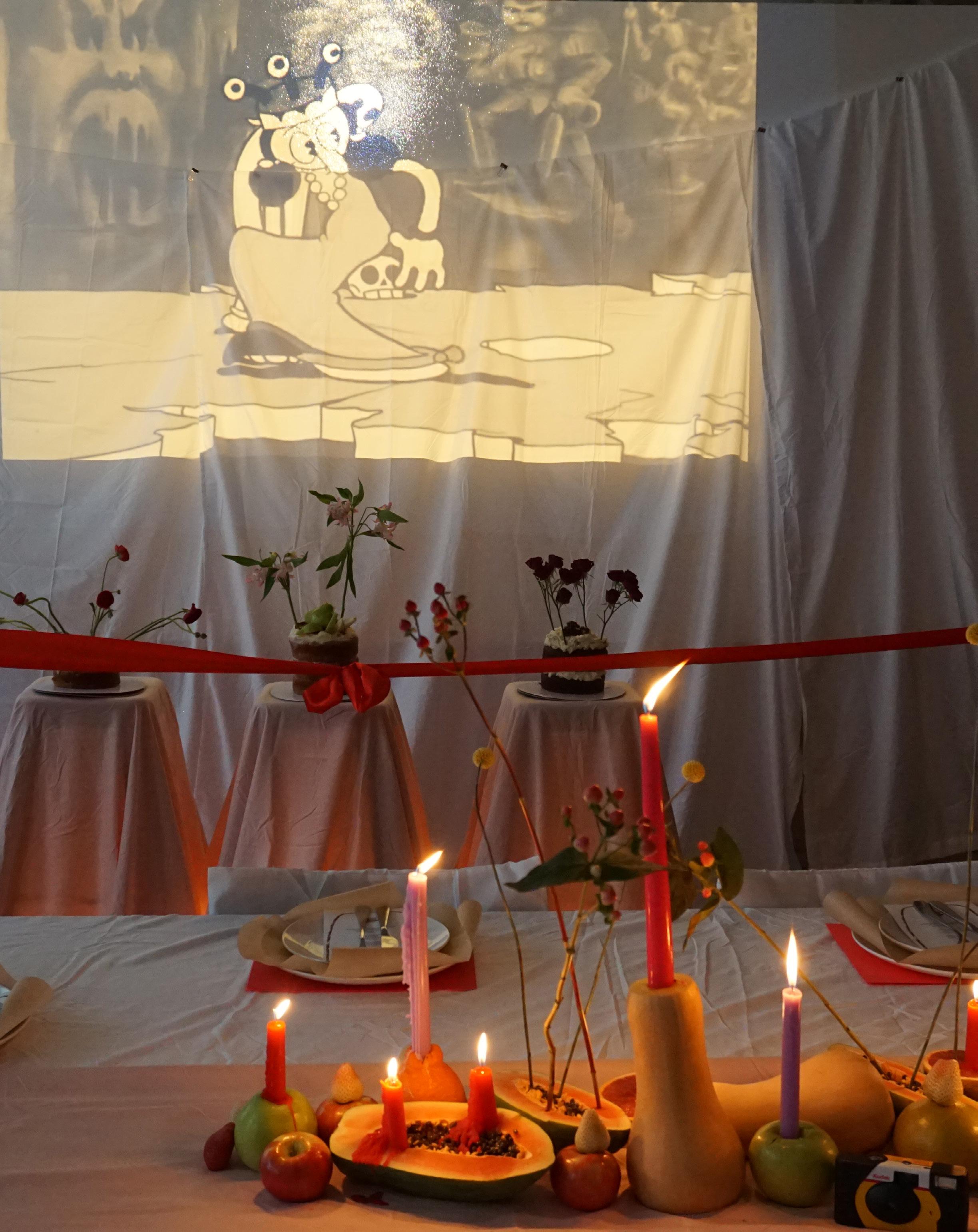
Blood Sugar is a cake & bake shop all about baking menstrual confidence into every cake for the period party of your dreams.
Why a celebration? Celebrations are ritualistic and historically represent moments of care within a community. Think birthday parties, coming-of-age celebrations, and more. They also allow for new kinds of celebrations to be easily accepted or adopted in communities of any age or experience .
Blood Sugar held its inaugural Launch Party, in an effort to create and disseminate a period party recipe that partygoers and viewers alike can steal, adjust, and tailor to their taste!
The party’s agenda included three cake tastings. The Seed: Reflecting on Early Menstrual Experiences, The Flower: Reflecting on Menstruation as an Adult, and The Fruit: Reflecting on Menopause & Relationships with Elder Menstruators. The physical design transformed the idea of traditional menstrual-related aesthetics. Using cake-stained bed sheets, clotty-looking jam, and cut fruits and melted red candles to remind of the physical experience of menstruation.
Creating richer and more nuanced documentation of menstrual experiences can help shift the mental models and words we associate with menstruation on a regular basis. And in turn, incorporate a new ritual into our everyday lives.
This event was produced with my partner, Charvi Shrimali.

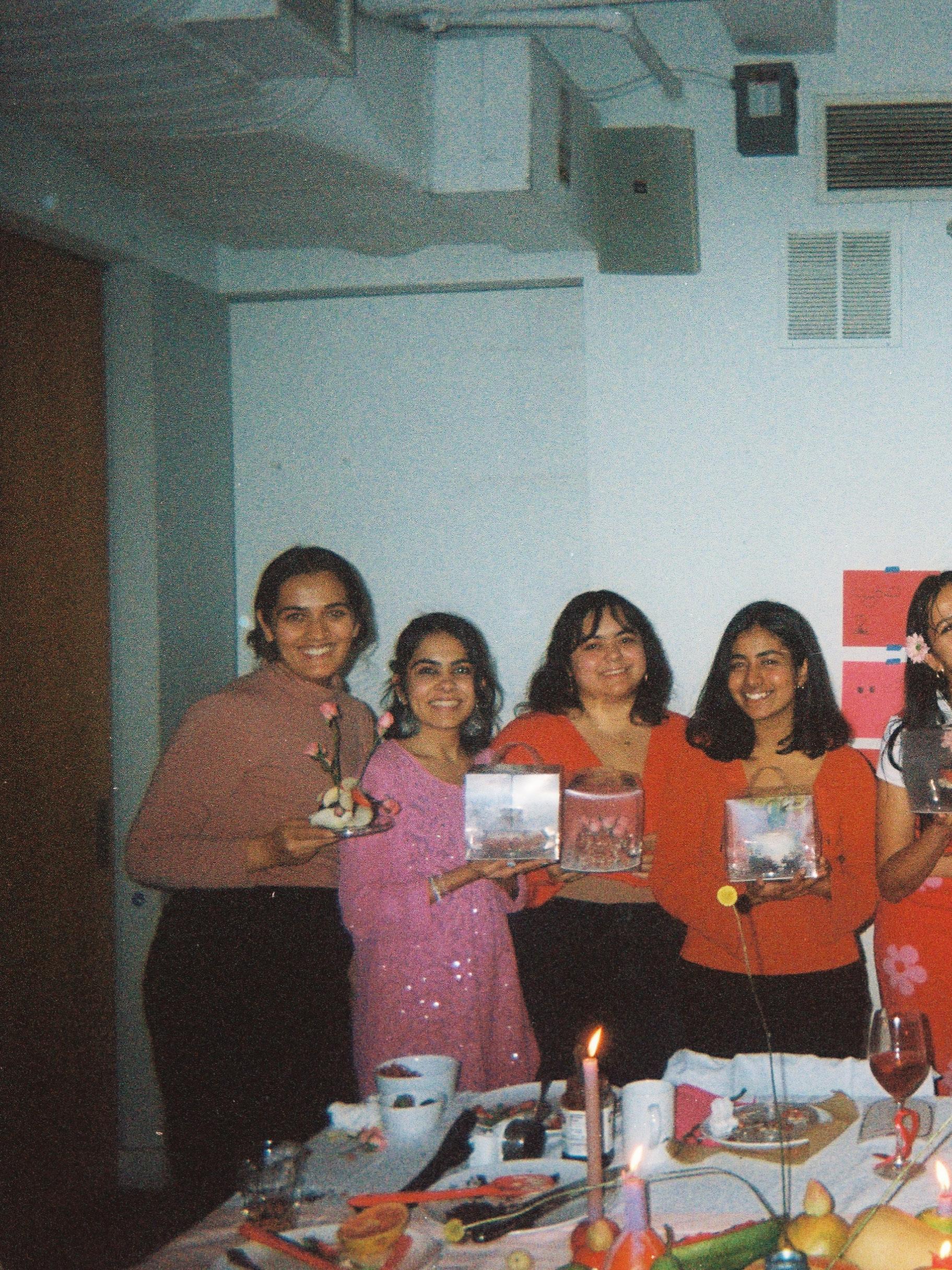
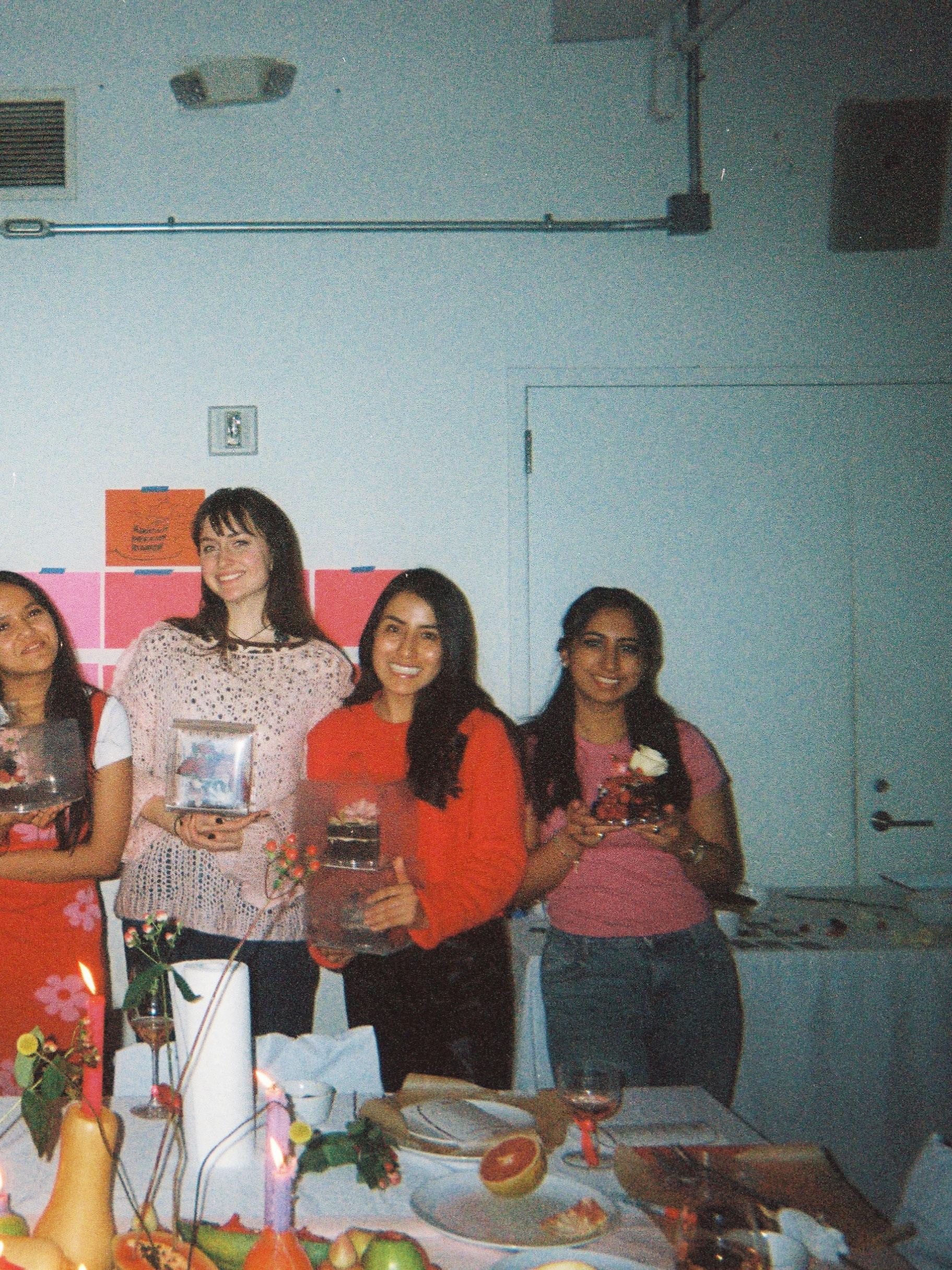

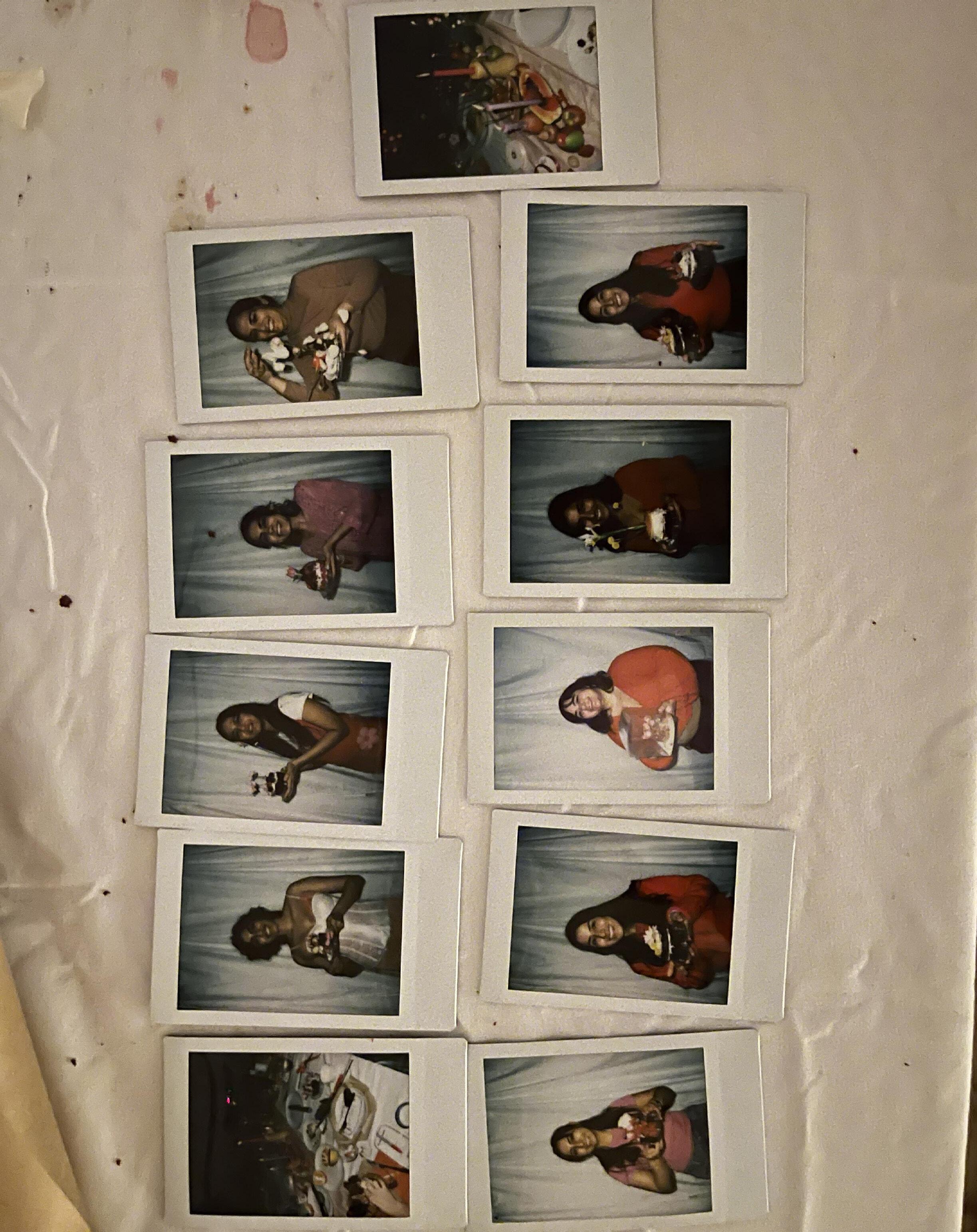
Speaking of rituals, when was the last time you sat with a partner or family member and checked on their menstrual experience? After speaking with many non-menstruators in my community, one said something that hadn’t clicked before:
“There needs to be an easier, more straightforward way to support the menstruators in my life.”
The role of allies can be essential to one’s menstrual experience. Maybe some of you in the audience are curious about how you can tangibly support the menstruators in your lives.
What if we reframe an ally and a menstruator to a ‘Sidekick’ and a ‘Hero’. Does that make you excited?
CODE!RED ~ We’ve cracked the code, so you don’t have to! CODE!RED is a paired digital experience designed for a menstruator’s community members or sidekicks to support them by completing actionable, tailored, tangible quests. It brings heroes and sidekicks together to complete missions of menstrual care and confidence, tailored using our very own menstrual love language quiz. By aligning love languages and piggybacking off of a Hero’s health tracking apps, CODE!RED will send Sidekicks’ missions based on their Hero’s needs, preferences, mood!
To show you how the paired experience works, let’s say we have a pair of long-distance romantic partners: Marlo (Sidekick) & Nima (Hero) Marlo comes across the CODE!RED website and creates his Hero Portal. He invites Nima to match with him, and adds their type of relationship and their distance. These two factors will help CODE!RED send tailored and achievable quests to Marlo!
Once Nima accepts the invite, she will give CODE!RED permission to track her apple watch inputs.To finish the pairing, both parties will take their love language quiz and download the CODE!RED app. Marlo will receive quests by notification. Once in the app, his dashboard will show previous and current quests, including his newest one. He will chat with CODE!RED to choose his quest, give feedback, and log his progress along the way. Post-Quest, both Marlo & Nima can log feedback so CODE!RED can recommend better quests next time, and aggregate a more comprehensive FAQ on each love language type.
Each menstrual experience is unique, so it can be difficult for a sidekick to find a way to care for the various heroes in their lives: a partner, a sister, a mother, etc.
CODE!RED takes out the guesswork for the sidekick. Using a gamified digital experience allows for both heroes and sidekicks to have fun with practicing their menstrual confidence as a team!
How can we help menstrual allies provide tangible help to their menstruator counterparts?




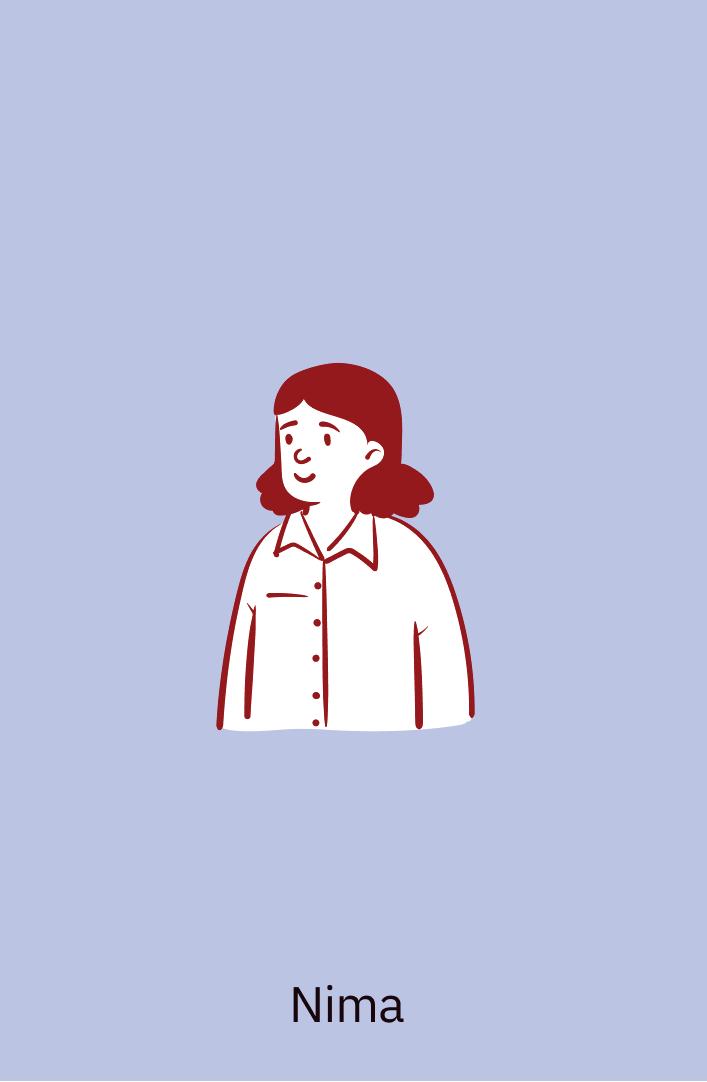
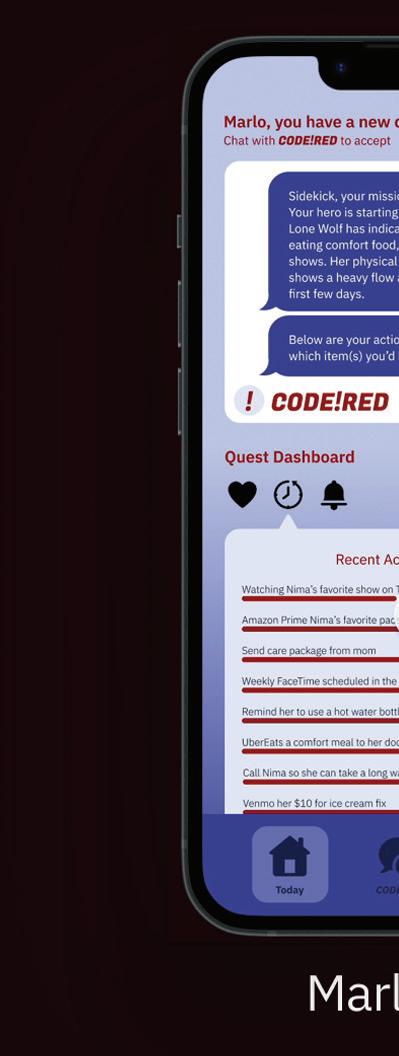



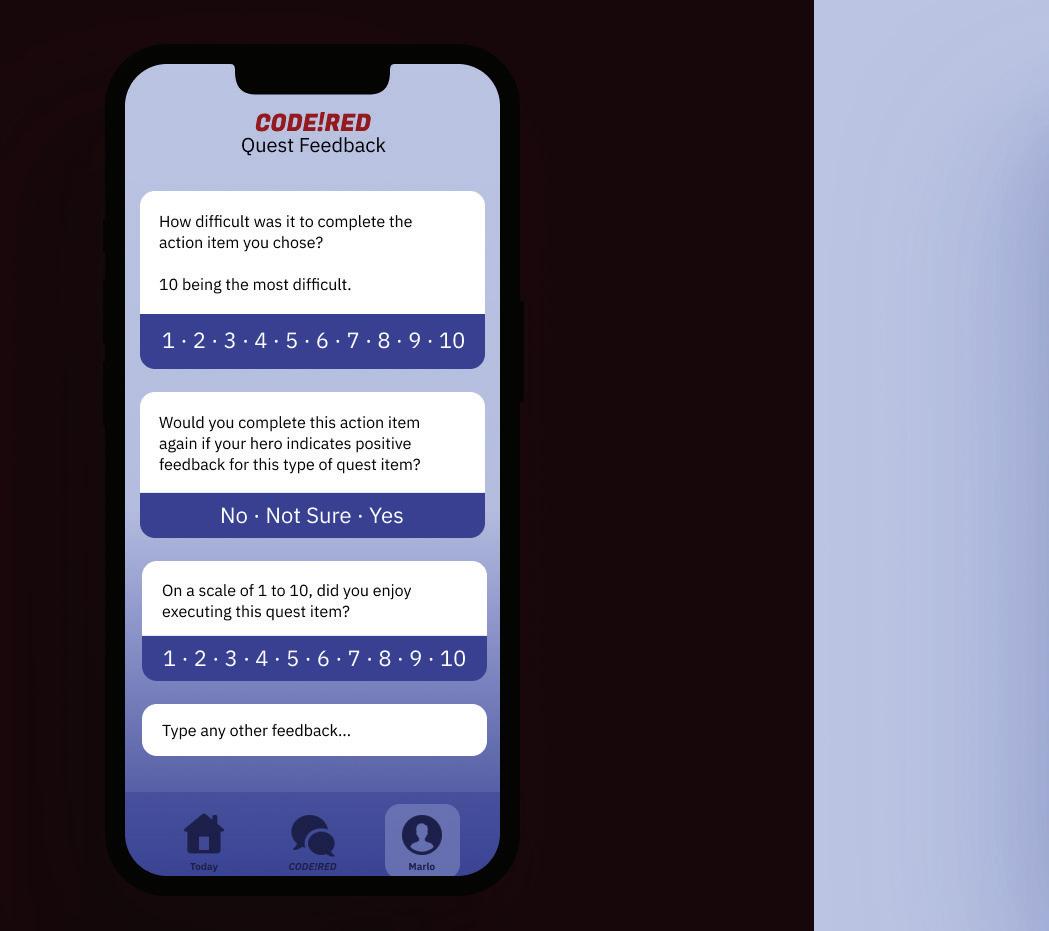
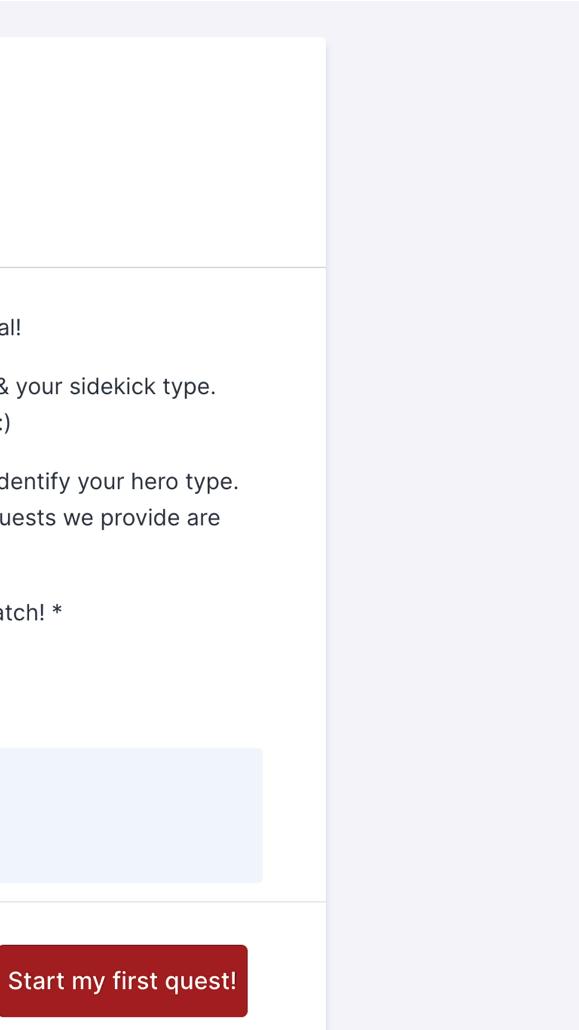




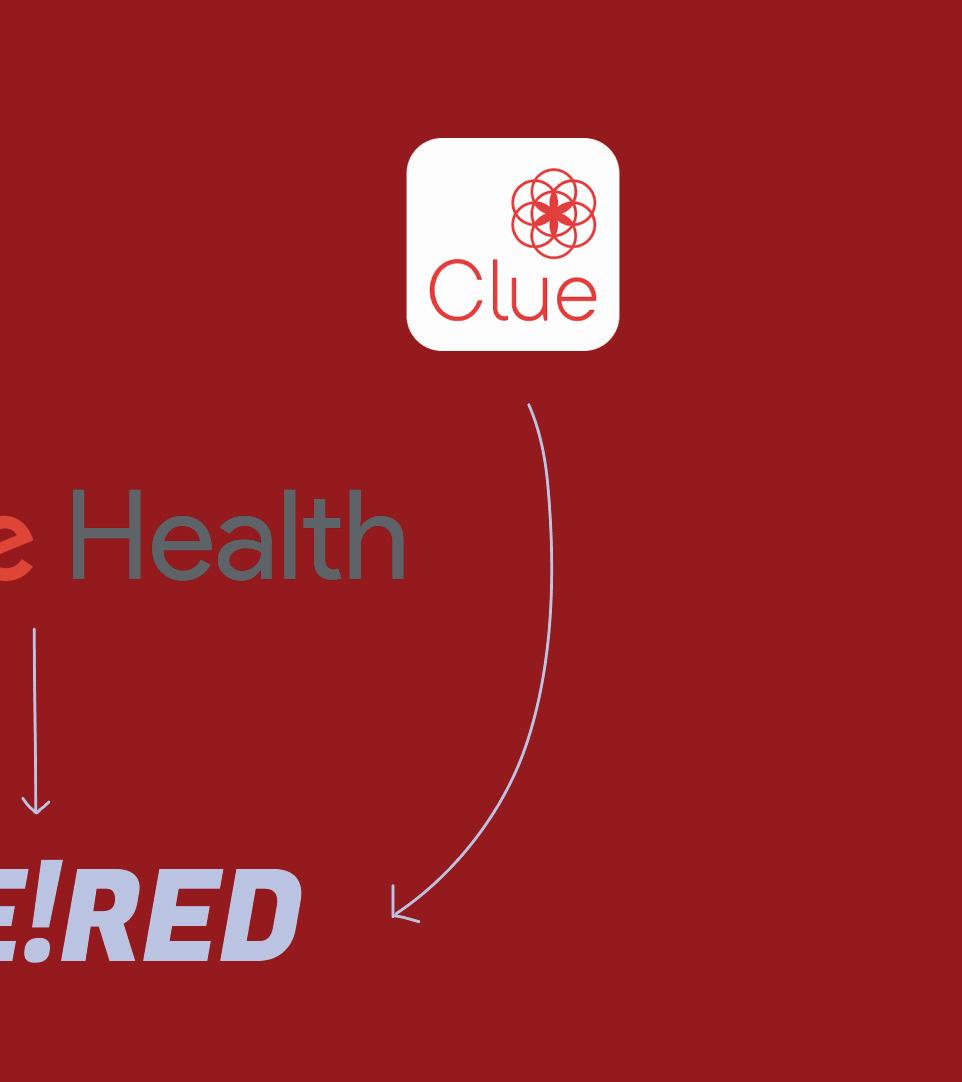
Anderson, Karen O., Carmen R. Green, and Richard Payne. “Racial and Ethnic Disparities in Pain: Causes and Consequences of Unequal Care.” The Journal of Pain 10, no. 12 (December 1, 2009): 1187–1204. https://doi.org/10.1016/j.jpain.2009.10.002.
Archive, View Author, and Get author RSS feed. “Periods Surprise Most American Girls,” July 10, 2018. https://nypost.com/2018/07/10/ american-girls-shockingly-unprepared-for-their-first-period/.
BBC Radio 4. “28ish Days Later,” n.d. https://open.spotify.com/ show/0le1kyKiXmaI8fsZL8owqp.
Bloody Good Period. “Decolonising Menstruation: An Introduction,” May 19, 2021. https://www.bloodygoodperiod.com/post/decolonising-menstruation-an-introduction.
Bobel, Chris. “Introduction: Menstruation as Lens—Menstruation as Opportunity.” In The Palgrave Handbook of Critical Menstruation Studies, edited by Chris Bobel, Inga T. Winkler, Breanne Fahs, Katie Ann Hasson, Elizabeth Arveda Kissling, and Tomi-Ann Roberts, 1–6. Singapore: Springer, 2020. https://doi.org/10.1007/978-981-150614-7_1.
Bobel, Chris, Inga T. Winkler, Breanne Fahs, Katie Ann Hasson, Elizabeth Arveda Kissling, and Tomi-Ann Roberts, eds. The Palgrave Handbook of Critical Menstruation Studies. Singapore: Springer, 2020. https://doi.org/10.1007/978-981-15-0614-7.
“Bouba/Kiki Effect.” In Wikipedia, March 12, 2024. https://en.wikipedia.org/w/index.php?title=Bouba/kiki_effect&oldid=1213263141.
“Charis Chambers, MD, FACOG (@theperioddoctor) • Instagram Photos and Videos.” Accessed May 13, 2024. https://www.instagram. com/theperioddoctor/?hl=en.
Columbia University Mailman School of Public Health. “Menstruation in the U.S.,” September 30, 2020. https://www.publichealth.columbia.edu/research/programs/gate/our-work/menstruation-u-s.
Demopoulos, Alaina. “Ninety Years since the First Tampax, Why Aren’t There Better Menstrual Products?” The Guardian, May 4, 2023, sec. Society. https://www.theguardian.com/society/2023/may/03/ tampons-pads-period-products-menstruation.
Design Observer. “Better Living by Design.” Accessed March 20, 2024. http://designobserver.com/feature/better-living-by-design/15908.
Dominus, Susan. “Women Have Been Misled About Menopause.” The New York Times, February 1, 2023, sec. Magazine. https://www. nytimes.com/2023/02/01/magazine/menopause-hot-flashes-hormone-therapy.html.
Ghorayshi, Azeen. “Puberty Starts Earlier Than It Used To. No One Knows Why.” The New York Times, May 19, 2022, sec. Science. https://www.nytimes.com/2022/05/19/science/early-puberty-medical-reason.html.
Gillibrand, Rachael. “‘Dirty Red’: How Periods Have Been Stigmatised through History to the Modern Day.” The Conversation, August 22, 2023. http://theconversation.com/dirty-red-how-periods-havebeen-stigmatised-through-history-to-the-modern-day-206967.
Gilligan, Carol. Ebook of In a Different Voice: Psychological Theory and Women’s Development. Harvard University Press, 2003. https:// hdl.handle.net/2027/heb32978.0001.001.
“Images (265×190).” Accessed March 20, 2024. https://encrypted-tbn0.gstatic.com/images?q=tbn:ANd9GcRm4Lri2jW4FVTmRcTQhX5wvMCT2nwXP3no5Yaw0ovzywd8td0TP7kUAdoVHHZ952L3voo&usqp=CAU.
Jakubowski, Karen P, Emma Barinas-Mitchell, Yue-Fang Chang, Pauline M Maki, Karen A Matthews, and Rebecca C Thurston. “The Cardiovascular Cost of Silence: Relationships Between Self-Silencing and Carotid Atherosclerosis in Midlife Women.” Annals of Behavioral Medicine: A Publication of the Society of Behavioral Medicine 56, no. 3 (June 14, 2021): 282–90. https://doi.org/10.1093/abm/kaab046.
Kernodle Clinic. “The 4 Menstrual Cycle Phases.” Accessed December 18, 2023. https://www.kernodle.com/obgyn_blog/the-4-menstrual-cycle-phases/.
Lacroix, Amy E., Hurria Gondal, Karlie R. Shumway, and Michelle D. Langaker. “Physiology, Menarche.” In StatPearls. Treasure Island (FL): StatPearls Publishing, 2023. http://www.ncbi.nlm.nih.gov/ books/NBK470216/.
Men Explain Things to Me, n.d.
“Menstrual Euphemisms by Language.” Accessed April 8, 2024. https://helloclue.com/articles/culture/top-euphemisms-for-period-by-language.
“Menstrual Health Is Everybody’s Business - The Record.” Accessed December 17, 2023. https://recordnepal.com/menstrual-health-is-everybodys-business.
Michel, Janet, Annette Mettler, Silvia Schönenberger, and Daniela Gunz. “Period Poverty: Why It Should Be Everybody’s Business.” Journal of Global Health Reports 6 (February 22, 2022): e2022009. https://doi.org/10.29392/001c.32436.
“Nadya Okamoto (@nadyaokamoto) • Instagram Photos and Videos.” Accessed May 13, 2024. https://www.instagram.com/nadyaokamoto/?hl=en.
Olson, Mary M., Nay Alhelou, Purvaja S. Kavattur, Lillian Rountree, and Inga T. Winkler. “The Persistent Power of Stigma: A Critical Review of Policy Initiatives to Break the Menstrual Silence and Advance Menstrual Literacy.” PLOS Global Public Health 2, no. 7 (July 14, 2022): e0000070. https://doi.org/10.1371/journal.pgph.0000070.
Pasha-Robinson, Lucy. “Nearly Half of Girls Do Not Know What Is Happening When They Start Their First Period, Study Reveals | The Independent.” The Independent, March 21, 2017, sec. Lifestyle. https://www.independent.co.uk/life-style/health-and-families/ health-news/girls-teenagers-start-period-menstruation-education-womens-health-betty-for-schools-a7636246.html.
“Press Release: Time to End the Stigma | Endometriosis UK.” Accessed April 26, 2024. https://www.endometriosis-uk.org/press-release-time-end-stigma.
Products of Design. “ORA: An Intuitive Redesign of the Menstrual Cup and Applicator.” Accessed December 17, 2023. https://productsofdesign.sva.edu/projects/ora-menstrual-cup-and-applicator.
Ramsay, Caitlin, Julie Hennegan, Caitlin H. Douglass, Sarah Eddy, Alexandra Head, and Megan S. C. Lim. “Reusable Period Products: Use and Perceptions among Young People in Victoria, Australia.” BMC
Women’s Health 23 (March 11, 2023): 102. https://doi.org/10.1186/ s12905-023-02197-3.
Rohatgi, Aishwarya, and Sambit Dash. “Period Poverty and Mental Health of Menstruators during COVID-19 Pandemic: Lessons and Implications for the Future.” Frontiers in Global Women’s Health 4 (March 1, 2023): 1128169. https://doi.org/10.3389/fgwh.2023.1128169.
Sole-Smith, Virginia. “Why Are Girls Getting Their Periods So Young?” Scientific American, May 1, 2019. https://www.scientificamerican. com/article/why-are-girls-getting-their-periods-so-young/.
Sveinsdóttir, Herdís. “Menstruation, Objectification and Health-Related Quality of Life: A Questionnaire Study.” Journal of Clinical Nursing 27, no. 3–4 (2018): e503–13. https://doi.org/10.1111/jocn.14049.
The Economist. “A Long Overdue Disruption in Menstrual Products.” Accessed September 8, 2023. https://www.economist.com/business/2018/03/31/a-long-overdue-disruption-in-menstrual-products.
The Economist. “Not Enough Is Known about the Science of Pads and Tampons.” Accessed September 7, 2023. https://www.economist. com/science-and-technology/2022/12/14/not-enough-is-knownabout-the-science-of-pads-and-tampons.
20+ interviews were conducted with consent with menstruators of ages ranging from 17 to 56 years old. All identifiable information is concealed other than age. References to these interviews will have the following structure: x years-old menstruator.
Other interviews with experts in various fields conducted with consent and permission to share identifiable information.
Alana Castle (MPH Student in Epidemiology) in discussion with the author, December 2023.
Anmol Sharma (MGH, Gender-Based Violence Case Worker) in discussion with the author, April 2024. Anne Quito (Journalist, Design Critic) in discussion with the author, December 2023.
Antya Waegmann (Rape Kit Expert) in discussion with the author, De-
cember 2023.
Chris Bobel (Menstrual Critical Studies, Professor of Women’s Studies) in discussion with author, December 2023.
Cornelia Smith (Pelvic Exam Expert) in discussion with the author, October 2023.
Danna Krouham (Chronic Pain Expert) in discussion with the author, December 2023.
Dori Jacobson (Service Designer, Sexual and Reproductive Health) in discussion with the author, December 2023.
Elizabeth Kissling (Professor of Women’s and Gender Studies at EWU) in discussion with the author, December 2023.
HK Dunston (Feminist, Climate Researcher) in discussion with the author, October 2023, December 2023, March 2024.
Jesselina Rana (Co-Founder of Pad2Go, Harvard Law Graduate) in discussion with author, December 2023.
Margaret Johnson (NYU Professor of Clinical Law: Menstrual and Reproductive Justice) in discussion with the author, December 2023.
Maria Fernandos Campos (FemTech Advocate, Service Designer) in discussion with the author, November 2023.
Nihaarika Arora (Ora Diva Cup Co-Designer, Industrial Designer) in discussion with the author, December 2023.
Raini Vargas (Social Impact Product and Service Designer) in discussion with the author, April 2024.
Dr. Sally King (Medical Sociologist, Founder of Menstrual Matters) in discussion with the author, April 2024.
Dr. Shruthi Mahalingaiah (Environmental and Menstrual Health Scientist and Physician) in discussion with the author, January 2024.
Susie Baldwin (Medical Director of Office of Women’s Health, LA County) in discussion with the author, April 2024.